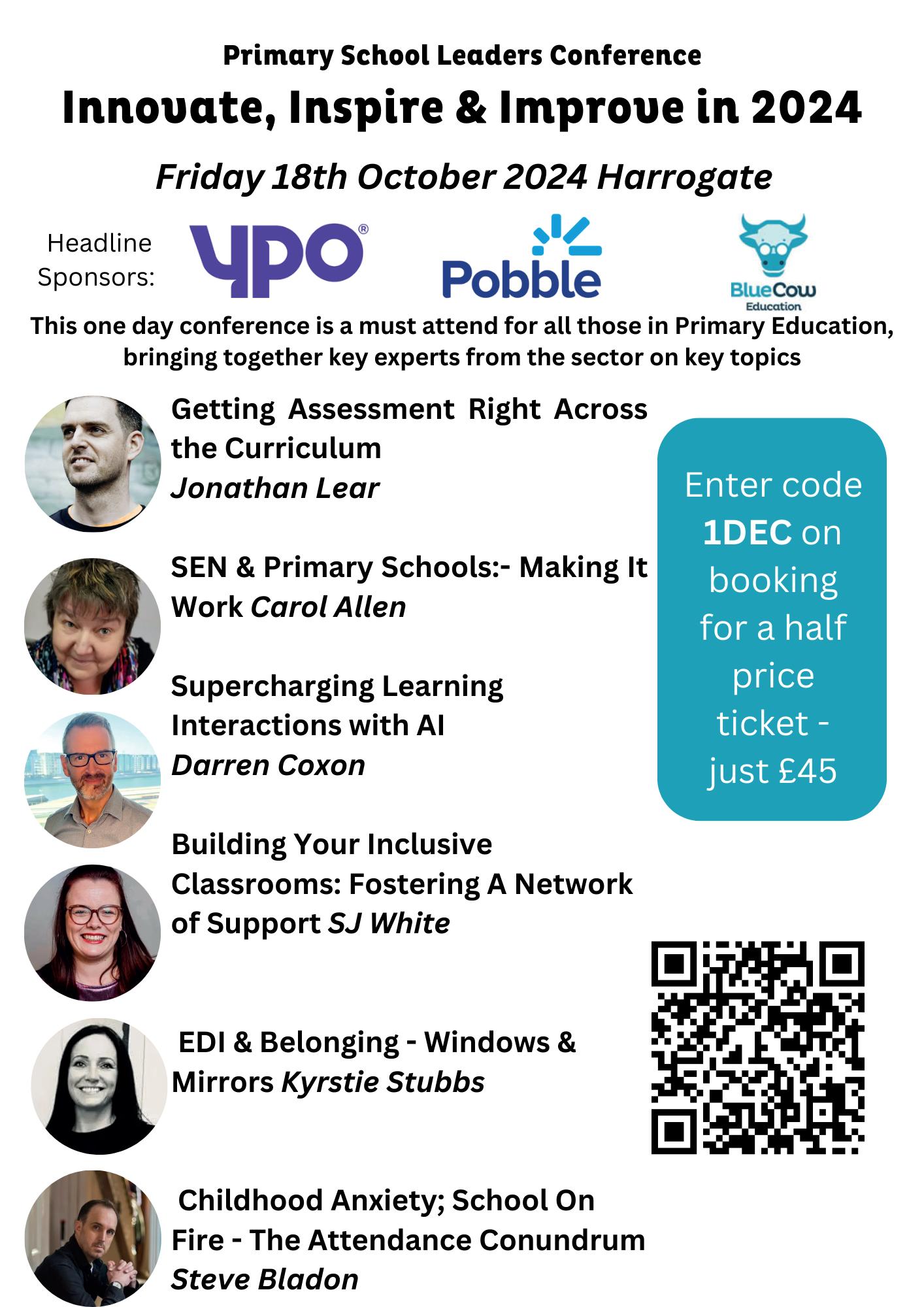

Teaching the dangers of vaping in primary schools
Features:
• PSHE: What's in a name?
• Could it be carer fatigue?
• The Period Product Scheme: How it's supporting puberty in primary schools





• PSHE: What's in a name?
• Could it be carer fatigue?
• The Period Product Scheme: How it's supporting puberty in primary schools



Create a survey for your school in three minutes (or less!)
Use our expertly crafted questions
See how your school compares to national benchmarks “The report is excellent. Very easy to understand and the comparison is very powerful. I am already a bit hooked... brilliant idea!”
R. Bottomley, Headteacher

4 Advocating for Safer Streets and Communities
1decision's Sophie Hearn examines the current state of our communities and how charities are supporting.
6 Summer Awareness Days
A round-up of PSHE and RSHE related awareness days and important dates for your diary.
8 PSHE: What's in a Name?
Sarah Lyles talks confusing acronyms, Ofsted pressures and why PSHE is vital in education.
12 Reducing the Barriers to Education; Period
Hayley Sherwood looks at The Period Product Scheme and how it's supporting puberty in primary schools.
14 Could it be Carer Fatigue?
Jean Langford explains what it is and the ways in which schools can safeguard their team to manage it effectively.
16 Fulfilling Potential & Pupil Progression
Di Page from Critical Publishing explores ways to help pupils progress vocationally.
18 5 Reasons Primary Schools Choose 1decision to Teach Early Years PSED
A quick rundown of the ways we can support EYFS.

20 Latest PSHE and RSHE News
A collection of the most important conversations, initiatives and news for PSHE, RSHE, PSED and personal development in primary.
24 National Read-Aloud Challenge
Find out how Fonetti are supporting children throughout the summer break.
28 Not to Miss: Trauma-Informed Education
Discover more about Encompass' Training Event for Teachers and Schools.
30 Real Stories & Recommended Resources
Year 3 primary teacher, Amy Swinburne, explains what it's like to teach primary PSHE with 1decision's content.
32 How to Teach First Aid to Kids
We investigate why it's important and showcase some of the best resources for your pupils.
34 Supporting Connections Between Primary Schools and Parents & Carers
We're exploring the need and provide some solutions from our friend's at SchoolTV.
36 Health FOCUS:
Teaching the dangers of vaping in primary schools
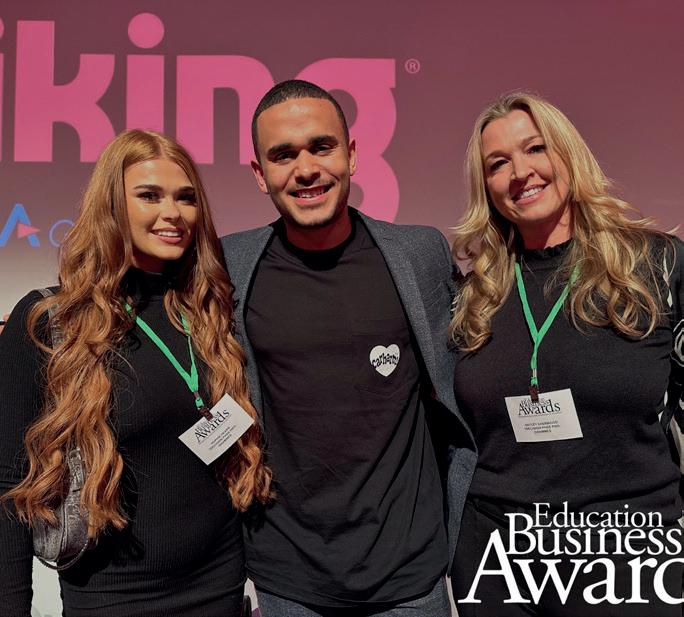
12 20 24


Hearn, Education Advisor at 1decision examines the current state of our streets and how organisations are helping to support others.
What does a safe society look like to you? For many of us, we want our streets to foster a sense of community, facilitate economic growth and promote outdoor activities for our health and positive wellbeing. Street safety is also a commitment to protecting our vulnerable population.
However, every week and sometimes every day, I see yet another story about an incident on our streets. The rise in reports of these horrific acts of violence and incidents happening right outside schools, on beaches and in tight-knit communities is simply terrifying to comprehend. More so, how children and young people are increasingly exposed to these crimes and are even the victim themselves.
Recently, a nine-year-old girl visiting family in London was left in a lifethreatening condition after being shot by an attacker on a motorbike while having dinner with her family. I struggle to unpick this disturbing setting and make sense of it.
We deserve to be able to live without fears in our homes and streets, reach the destinations we are aiming for and to go about our lives without threats to our safety. Yet countless individuals face the destruction of crime on a daily basis and it only seems to be getting worse.
This time last year, due to a personal experience involving a loved one, I found myself navigating the justice system. For a long period, it was a daunting and overwhelming situation and has left me with so many questions on the state of our system.
While my gratitude still lies with the investigating officer and CPS, who were responsive and supportive at all levels, I echo that the justice system is not robust enough in this country and there is an awful long way to go.
As a society, we keep receiving promises from the government and calls-for-action seem to fall on deaf ears by the tireless

organisations and individuals who campaign for change and more support. It is crucial for policymakers to listen seriously and take decisive steps to make our streets safer. Every single manifesto for this general election should outline the work that must be done to move forward as a society. Until we see concrete action, it is difficult to talk about the many different factors that cause such devastating incidents on our streets.
However, what I do know is that immense work has been ongoing by many organisations, including two of which I recently donated to and wanted to shout out about.
SOCIETY SAFE
Whether you’re a teacher, parent/carer, child or adolescent; learning how we can stay and feel safer on the streets can mean the difference between flourishing and surviving.
Organisations like Childline, Victim Support and Strut Safe play a vital role in this mission.
HELPLINES FOR CHILDREN:
As you’ll most likely know, Childline has a support line for anyone under the age of 19 in the UK to discuss any worries and issues. This now also includes a 24/7 web chat and a video chat service, which uses a BSL interpreter.
0800 1111 (Free 24/7) childline.org.uk

HELPLINES FOR TEACHERS AND ADULTS:
You’re never too old to stay educated on community safety and the support options available. Unfortunately, as we see too often, street and community crime affects both young and old.
Victim Support provides assistance and advocacy for those affected by crime, ensuring they receive the help they need to recover and regain a sense of security.
"If we can change just one child’s life, then we know that our work here is done"
Strut Safe offers services to those walking alone at night, providing a lifeline and peace of mind for countless individuals.
0333 335 0026
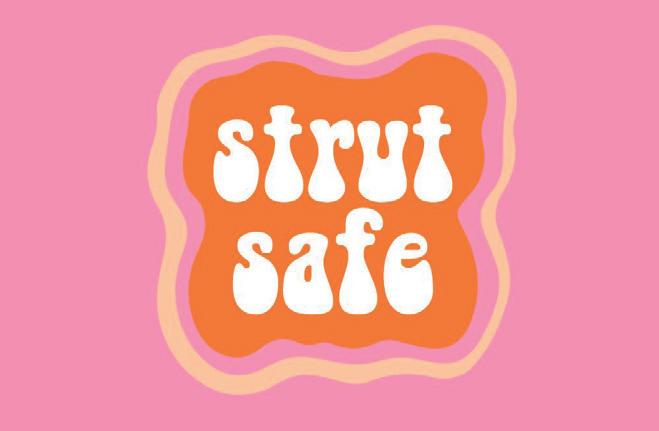
My work at 1decision continues to support children from societal issues, equipping them with essential life skills and knowledge through engaging educational resources. Whereas, we may never cure these issues, prevention is key; if we can change just one child’s life, then we know that our work here is done.
Based on my own experience and the experiences of others, I recognise that these do not define us, rather they become sources of immense strength and resilience. Such events empower us to acknowledge and validate our trauma. This is an essential part for both encouraging the healing process and enacting the fight for meaningful change. I hope we can action change before too many more innocent people become a statistic.
Teach our Staying Safe Topic with confidence. Download resources that help you educate your pupils on how to stay safe on the streets and in our communities. If you’re not already a customer, trial our taster pack.
0808 168 9111 FOR A

Currently, it costs £500 every month to fund Strut Safe’s phone-line three nights a week AND the team are all completely volunteer led. By highlighting the need for awareness and supporting such organisations, we can amplify their impact and ensure more people have access to the resources they need.

Sophie has been an Education and Partnerships Advisor at 1decision since 2021 and supports schools, as well as networking with like-minded organisations and individuals. She is passionate about inspiring and educating the next generation, shaping their future for the better. 1decision at a time! sophie@1decision.co.uk

World First Aid Day
14TH SEPTEMBER
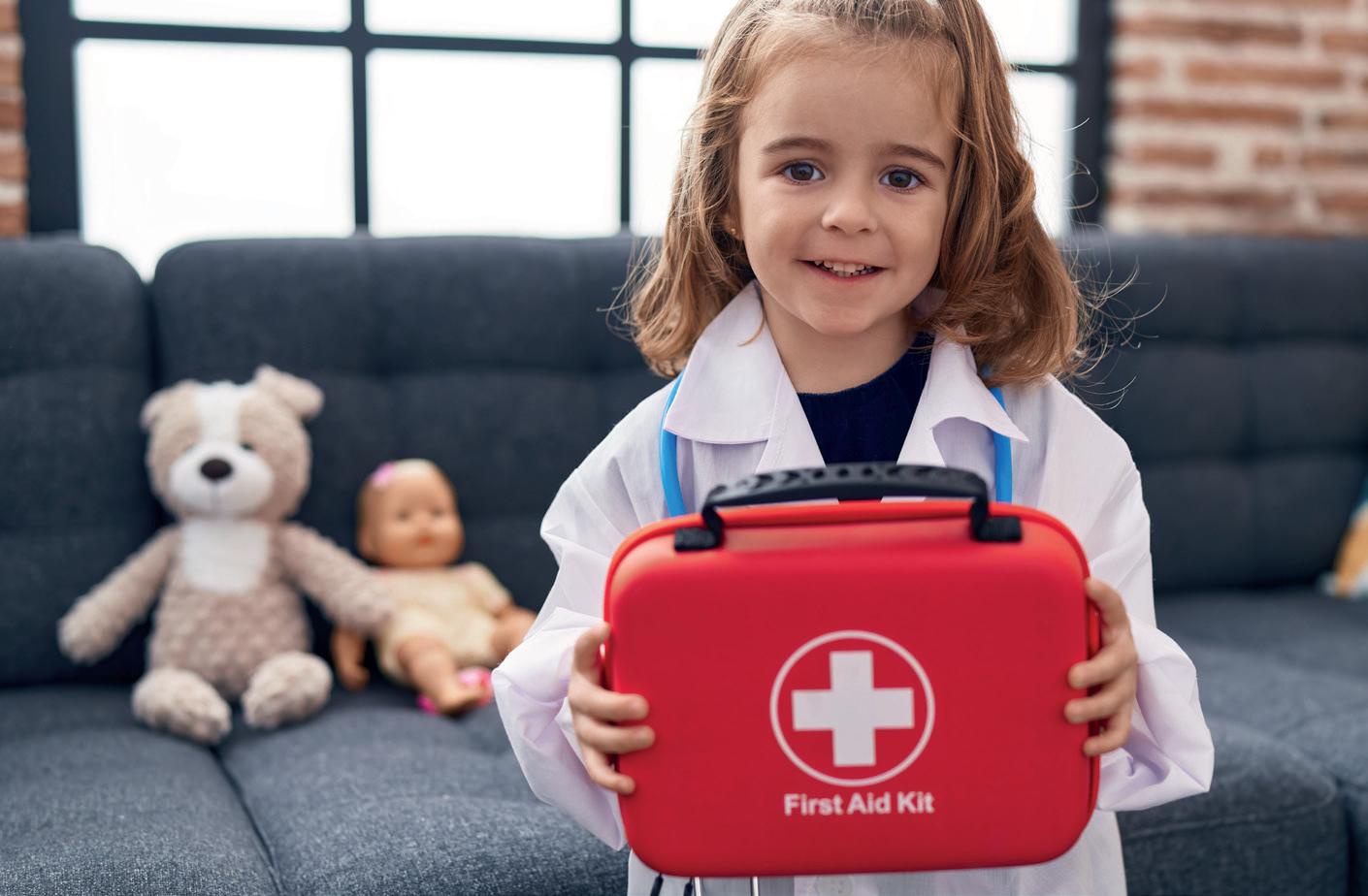
Awareness days in primary schools serve as windows to the world, expanding young minds beyond textbooks. They teach empathy, tolerance, and critical thinking by introducing pupils to diverse cultures, societal issues and global challenges. These occasions cultivate values like compassion and social responsibility, promoting a sense of community involvement. Awareness days also bridge the gap between classroom learning and real-world relevance, inspiring pupils to become informed,
active citizens. Ultimately, they play a crucial role in shaping well-rounded individuals who appreciate diversity, understand interconnectedness, and are prepared to make positive contributions to their communities and the world at large.
It is highly unlikely that schools will have the time or resources to cover every awareness day but here are some of the ones coming up over the next few months.
1st – 31st – Talk to Us – See Sophie's article for charity support lines on page 4
1st – 31st – Plastic Free July
4th – Thank you to Teaching Assistants!
14th – Disability Awareness Day
18th – Nelson Mandela Day
25th – World Drowning Prevention Day
30th – International Day of Friendship
1st – 31st – National Road
Victim Month
7th – Playday – National UK Day of Play
8th – Cycle-to-Work Day
12th – International Youth Day
1st - 30th – Childhood Cancer Awareness Month
13th – Roald Dahl Story Day
14th – World First Aid Day
21st - 27th – Recycling Week
International Day of Friendship
30TH JULY
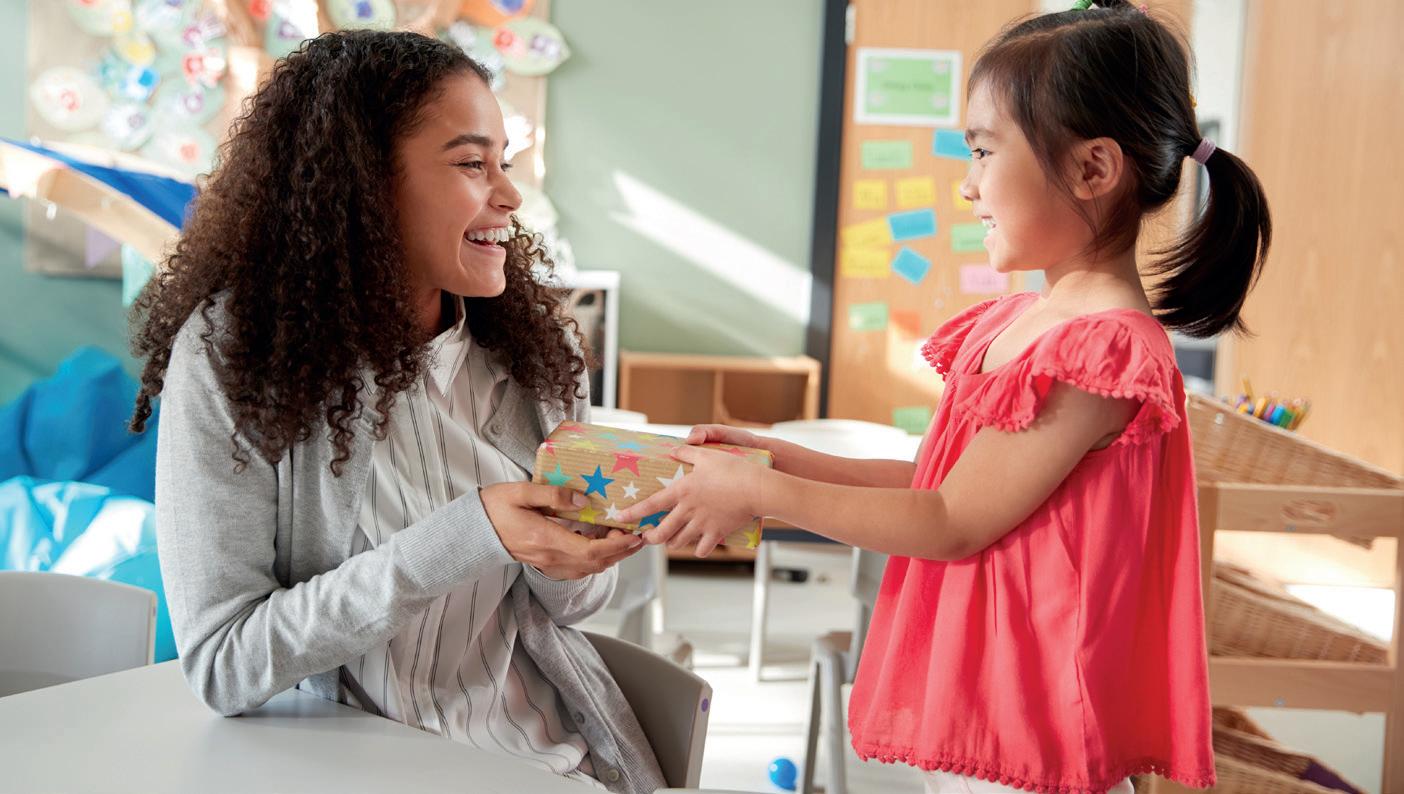
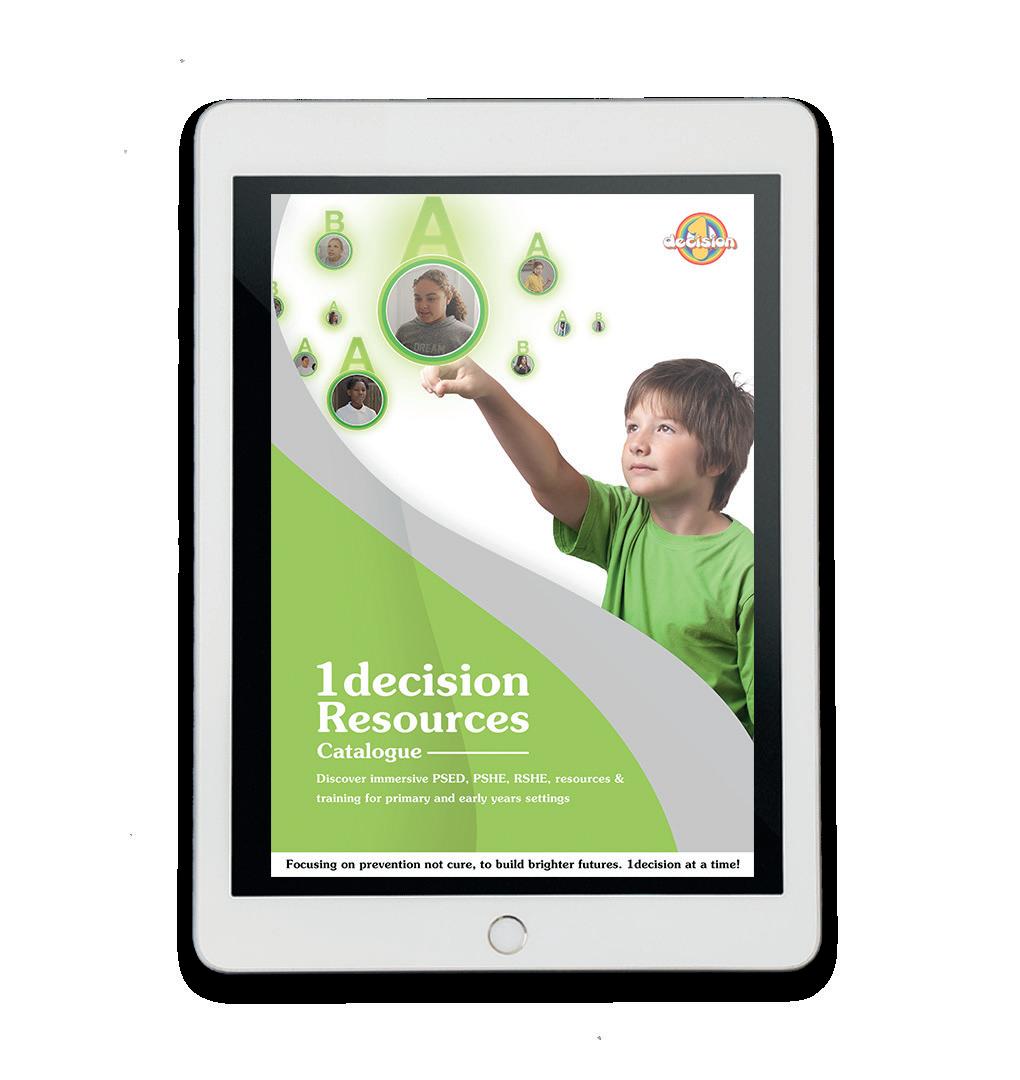



Reading On Your Head is designed to raise standards in reading!
Assign one of our online activities to a whole class in only a few clicks.
Get rich assessment data and determine exactly where to focus your time.
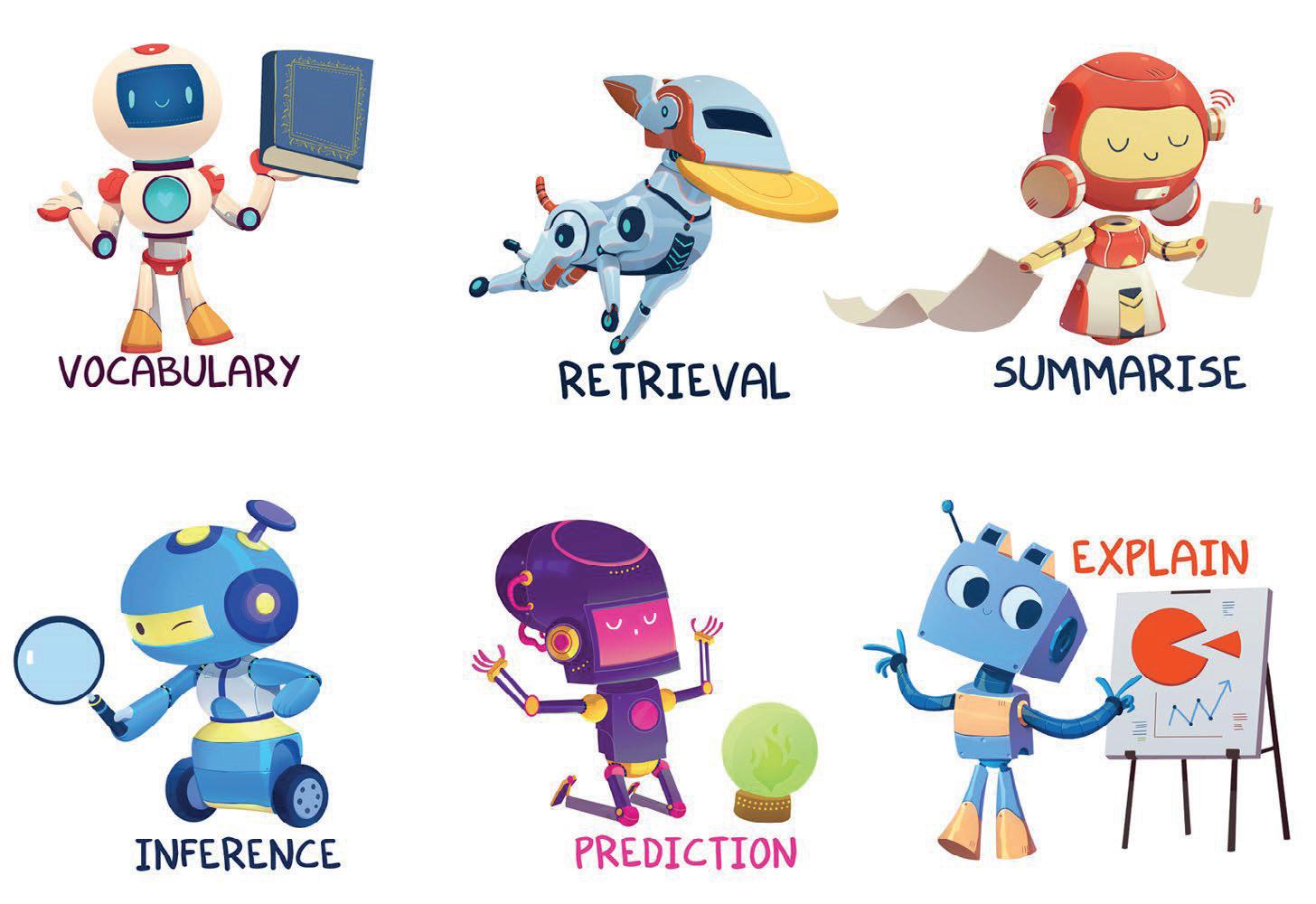
Resources are all online and can be printed. Our online quizzes are automatically assessed and instantly pinpoint exactly how well pupils are doing. Parents can access the same resources that are used in the classroom, allowing them to truly support with reading at home.
School leaders can effortlessly monitor pupil performance across reading content domains and quickly drill down from whole school level to individual pupil level.
As part of every subscription, we fully resource every text you use in reading.
Competition modes and quiz creation mode for pupils brings reading to life like never before and incentivises reading in a unique and engaging way. Get in touch and reboot reading in your school!
We believe in giving teachers time to teach!
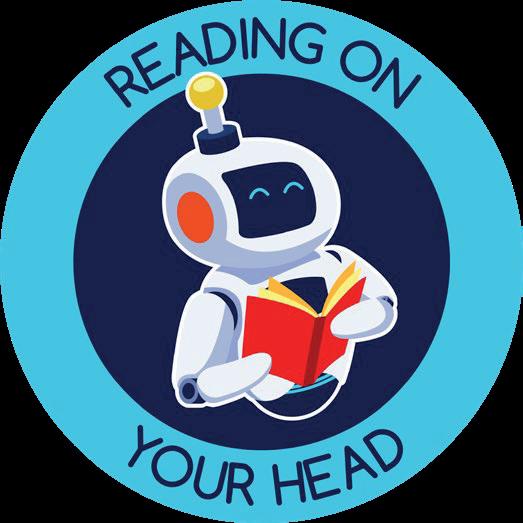
Sarah Lyles,
CONFUSED BEGINNINGS
I often think back to my days as a newly qualified teacher who knew nothing about Personal, Social, Health, Economic (PSHE) education. I remember the occasion when a senior member of staff thrust upon me a Circle Time resource and said, "Deliver an activity from this book during the Ofsted inspection, 'cos we need to show that we do this sort of stuff…".
What 'sort of stuff' this was, at the time I was unsure. Nevertheless, as a conscientious NQT, now termed Early Career Teacher (ECT), I planned my lesson, moved the chairs into a circle, and during the Ofsted inspection – delivered my first ever Circle Time session. Needless to say – my complete lack of subject knowledge and understanding produced a most sub-standard lesson. From that time on – I began my quest to understand more fully, what constitutes effective PSHE.
Over many years, I have seized countless opportunities to learn in-depth, study and reflect upon PSHE. My exceptionally shaky, unsupported, and untrained beginnings are something that I regularly contemplate, and now strive to prevent happening to others.
A BRIEF HISTORY OF PSHE EDUCATION
PSHE is a subject and should be considered as such.
In 1988 the Education Reform Act brought with it the National Curriculum.
This provided the initial non-statutory framework, which continues to underpin much of what we view as effective PSHE (before the additional 'E' for economic was added in 2007/8).
In 2003, the introduction of the Labour Government's Every Child Matters agenda marked one of the first significant steps forward for PSHE. This was furthered by a raft of policies and practices, such as the 2004 Children Act, the 2006 Education and Inspections Act which gave schools the duty of promoting pupil well-being, and the 2007 Children's Plan followed. Each had a role in helping to secure a firm curriculum place for PSHE.
In 2013, the Department for Education issued guidance stating that, "Personal, social, health and economic (PSHE) education is an important and necessary part of all pupils' education. All schools should teach PSHE, drawing on good practice…". Around the same time, the PSHE Association developed its PSHE Programme of Study. Updated and
amended, this document remains the foundation of a holistic programme of developmentally progressive PSHE. Significantly, in 2013, the Ofsted single subject review, PSHE: Not Yet Good Enough, found that:
"…the great majority of schools choose to teach it [PSHE education] because it makes a major contribution to their statutory responsibilities to promote children and young people's personal and economic well-being; offer Sex and Relationships education; prepare pupils for adult life and provide a broad and balanced curriculum".
The rise of importance in the subject has led to more changes in law. In 2017, the Children and Social Work Act paved the way for elements of PSHE to become statutory, this led to the current DfE


statutory guidance on Relationships Education, Relationships and Sex Education (RSE) and Health Education. Since the introduction of the DfE's statutory guidance, and a raft of wider related publications, I have noticed increased uncertainty regarding what schools should be teaching, and what the subject should be called.
During conversations with PSHE professionals, I find that there can be conflated use of RSHE and PSHE –sometimes with a reference to RSE and/ or Sex Education, and on occasions a lack of clarity regarding the differences. Additionally, when I read documentation provided for professionals – I again notice a raft of interchangeably applied PSHE related acronyms.
I want to take this opportunity to provide clarity around some issues that may be causing confusion and pose some important questions for leaders of PSHE.
PSHE is a planned programme of learning opportunities and experiences that help children and young people grow and develop as individuals and as members of families and communities. It equips them with knowledge, understanding and practical skills to live healthy, safe, fulfilled and responsible lives.
PSHE also enables children and young people to reflect on and clarify their own values and attitudes, and explore the complex and sometimes conflicting range of values and attitudes they encounter now and in the future. In short, PSHE makes a significant contribution to children and young people's personal development.
The above definition applied learning from the DfE National PSHE CPD Programme (2002 –2010).
PSHE education is a non-statutory subject and schools have the authority, expertise and flexibility to develop a comprehensive and holistic PSHE curriculum. A considered, tailormade and effective PSHE programme of study will help to provide pupils with a progressive sequence of learning experiences that helps to ensure that the needs of pupils within each schools' unique community are met. By ensuring a safe and considered learning
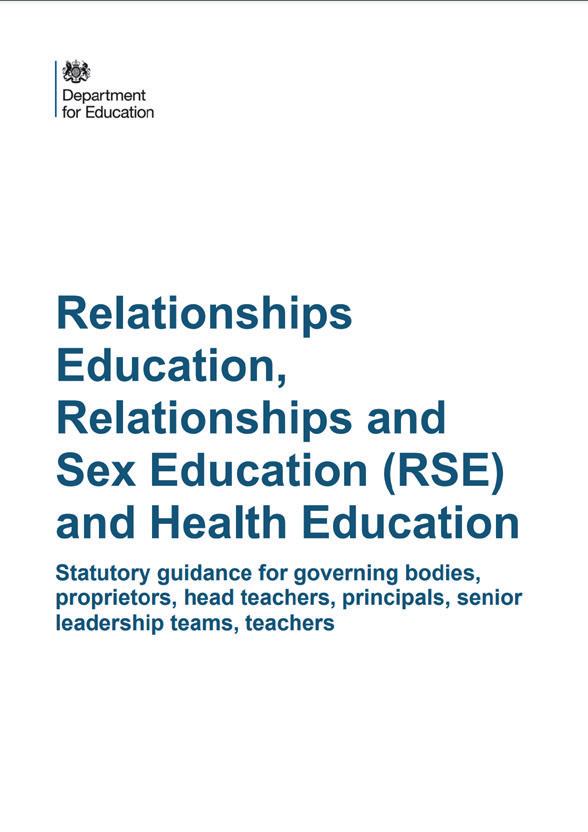
environment, using distancing techniques and appropriate scenarios that build transferable skills and child-centred knowledge, PSHE can be a full and rich subject that contains planned, meaningful opportunities for personal development. Effective PSHE takes a normative, strengths-based and trauma-informed approach, which is to say that it focuses upon building the skills, knowledge, understanding, and empowering attitudes & values of young people to further strengthen their resolve and resilience. This approach helps them to better understand what their peers are doing, and these are generally positive behaviours. Working in this way increases protective factors and helps to mitigate risk factors. Effective PSHE should not shock, induce fear or guilt – this is counterproductive and inappropriate PSHE practise.
Combined with effective spiritual, moral, social and cultural development, along with a supportive culture of safety –underpinned by empowering values and emotional intelligence can help to foster and scaffold a climate where pupils can develop, challenge and affirm their own and others' thinking.
In the 2017 report, a curriculum for life: the case for statutory PSHE education the PSHE Association capture the many benefits of effective PSHE education. They highlight the evidence that wellplanned and effective PSHE, along with a supportive school culture, can assist pupils in protecting themselves both on and offline, can help to improve physical and emotional health, support the development of resilience, academic achievement and employment prospects –with the greatest benefits experienced by the most disadvantaged pupils.

What are the statutory requirements for state-funded primary schools?
Primary schools must teach the statutory elements for Relationships Education and Health Education.
What are the statutory requirements for state-funded secondary schools?
Secondary schools must teach the statutory elements for Relationships Education, Sex Education and Health Education.
Parents/carers have the right to request that their child be withdrawn from some or all of Sex Education delivered as part of statutory RSE. At the point three terms before the child turns 16 if the child wishes to receive Sex Education rather than be withdrawn, the school should make arrangements to provide the child with Sex Education during one of those terms. What are the statutory requirements for Independent Schools?
"The statutory elements of Relationships Education, Health Education, and for secondary schools, Sex Education are a minimum entitlement. "
compulsory for both primary and secondary phases as independent schools must meet the (Independent School Standards) as set out in the Education Regulations 2014. The DfE suggests that independent schools may find the principles in the guidance on Health Education helpful in planning an ageappropriate curriculum.

The statutory elements of Relationships Education, Health Education, and for secondary schools, Sex Education are a minimum entitlement. This minimum, or core entitlement, is now often referred to as RSHE. This minimum entitlement - as set out in the DfE statutory documentprovides the basic scaffolding on which to build rich and needs-based holistic PSHE education that applies emotionally intelligent reflection.
A rigorous PSHE curriculum will consider specific issues within each school community along with local health data. This data, both qualitative and quantitative, can help direct your scheme of work accordingly. A meaningful PSHE curriculum will assist pupils to make sense of 'life' and the issues that affect them and will undoubtedly include learning in financial capability, careers, sustainability and more. It will be driven by empowering values, your school's duty to deliver its Public Sector Equality Duty, and support a balanced and broadly based curriculum which, along with effective safeguarding protocols, relationships/behaviour support, can help to build confidence,
wellbeing and better outcomes for children and young people.
To conclude this article, I raise some key developmental questions for PSHE professionals to consider in light of their current practice and provision: Are you secure in the difference between PSHE and RSHE, between what must be taught and what could be taught in order to help ensure an effective and impactive curriculum?
• Are you currently planning for and delivering PSHE, RSHE or both?
• What is the understanding of your wider staff, senior leadership, pupils, governors/trustees, parents/carers?
• What is the school vision/intent for PSHE? How was/could this be produced and communicated?
• What do you want to see – what do you want the impact of your PSHE provision to be?
• What are your next 3 key steps?
• Are you secure?
Sarah Lyles has been a PSHE Consultant for 18 years. In this time she has supported the development of a variety of PSHE resources, guidance documents and think tanks. From 2010 – 2019 she was the Lead for the DfE’s National PSHE CPD Programme PSHE, and has Chaired the PSHE Association Advisory Board. Currently the PSHE, Wellbeing and Surrey Healthy Schools Lead for Surrey County Council she is also a Partner of the Sex Education Forum.


www.youtube.com/c/Flourishwithus www.tiktok.com/@wearefl0urish

According to an April 2024 study, more than a third (36%) of girls in the UK are missing school because of their period pains.
The poll, which was conducted by the Wellbeing of Women and CensusWide charity, surveyed more than 3,000 girls and young women aged 12 to 18 to reveal how their periods affect attendance.
DID YOU KNOW THAT THE PERIOD PRODUCT SCHEME HAS BEEN EXTENDED?
The period product scheme provides free period products to girls and women in their place of study. It is available to statemaintained schools and the Department for Education (DfE) funded 16 to 19 education organisations in England. The scheme is running for the academic year 2023 to 2024. In April 2024, it was extended until July 2025.
DfE has a contract with Personnel Hygiene Services Limited (phs), which allows schools to order a wide range of period products and have them conveniently delivered.
Period products should be available for all who need them, when they need them, so they can access education without barriers.
The Government supplier, phs, will stock and deliver period products. They also offer customer service support relating to the ordering and delivery of products. Schools can order a range of period products, either online via the phs portal or over the phone, and have these delivered free of charge.
Click below to review The Period Product Provision Guidance:
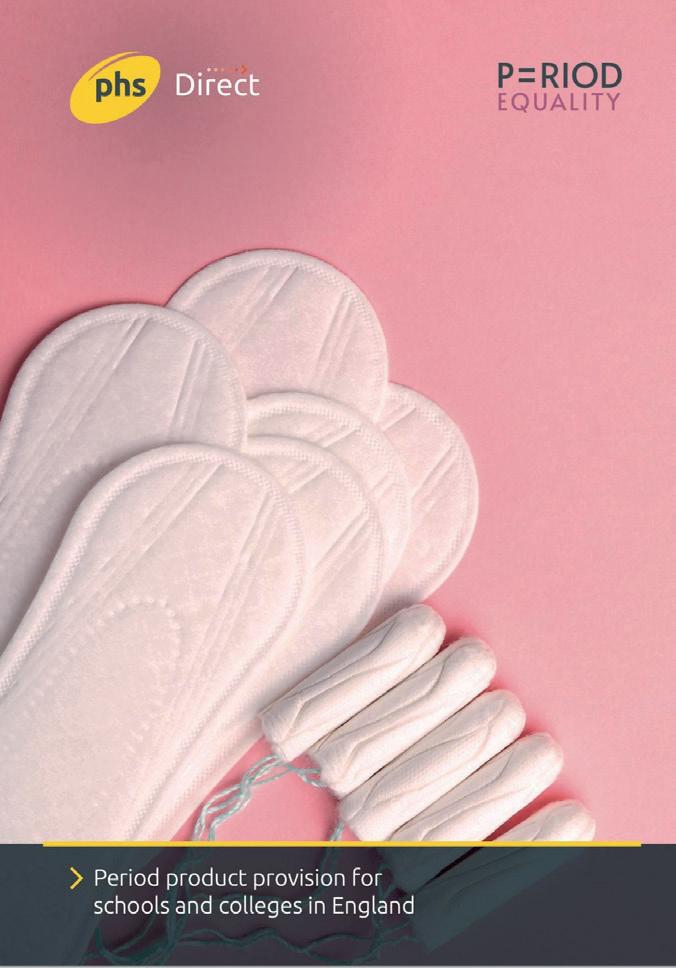

"The period product scheme provides free period products to girls and women in their place of study"
For each academic year, there's a spending cap that will reset at the beginning of the academic year.
TO FIND OUT HOW THEY CALCULATE THIS AND WHAT YOU WILL GET Click here
The available budget for your school or organisation will show on the ordering portal.
When ordering products, you could consider:
• reducing waste, and only order products when your stock is low
• whether the types of products you have selected address the needs of your pupils and students
• the environmental impact of the frequency of delivery
Whoever you are, wherever you live, menstruation should never be a barrier to education; period.
For further information on period and menstruation management in schools, visit phs and/or freeperiods.org.
WE'RE THRILLED TO INTRODUCE OUR INTERACTIVE CATALOGUE, PACKED WITH ENGAGING RESOURCES DESIGNED TO ENHANCE YOUR PSED (PERSONAL, SOCIAL AND EMOTIONAL DEVELOPMENT) AND PSHE (PERSONAL, SOCIAL, HEALTH AND ECONOMIC) EDUCATION.
WHY EXPLORE OUR CATALOGUE?
Innovative Content: Dive into a wealth of interactive and immersive materials, including engaging videos with alternative endings, on-screen lesson guides, rigid assessments, and activities that make learning fun and impactful.
Award-Winning Quality: Our resources are recognised for excellence, ensuring you get the best tools to support and enrich your curriculum in line with current guidance.
Videos: Review our high-quality videos inside.
READY TO ELEVATE YOUR CLASSROOM? Click the button below to explore our interactive catalogue and unlock a world of high-quality PSED and PSHE resources. Your journey to a more engaging and effective educational experience starts here!
Click here


As tiredness sweeps the school corridors and staff rooms, Jean Langford, NCS Accred Therapist explains what carer fatigue is and how schools can manage it effectively.
As we are coming to the end of the school year, we are very tired both mentally and physically in many cases.
The year has been a challenging one in many aspects. In any case, one group of people have also had to deal with another barrier: carer fatigue.
Teachers, alongside TAs, support workers and many others in education, are - in my opinion - some of the most unsung heroes of the 21st century. During a time when
the world is covered in uncertainty, it is even more imperative for those in such pastoral roles to take really good care of themselves.
Carer fatigue, however, adds another layer to this. It occurs when a carer is unable to take care of themselves as they are too busy caring for others.
Teachers, TAs and support staff are not
only teaching education but also helping support the physical and mental needs of some children and young people.
This article outlines what carer fatigue is in more detail and will provide you with some tips on fighting it if it is something you have been dealing with.
If you are a teacher who has experienced this/ are currently struggling, it is very important that you take action to improve the fatigue, tiredness, and overwhelming



feelings because if this continues, it could be dangerous for both parties involved. Not only can it cause great strain on you as an individual, but on your pupils too. The quality of care can be negatively affected as it is normal to become grumpy or to have a short fuse when overtired. Also to point out you are only human, and we all have our limits after all.
There are lots of ways you can prevent this from happening and one way is to make sure that you have regular rest so that the body can rejuvenate and recharge itself, not only the physical but mental also. Schedule it in if needed as this is also known as self-care!
Of course, this is easier said than done, but the key here is to focus on setting boundaries, taking the time to reflect and recognising when you are heading downhill. Asking for help isn't always easy and sometimes we can feel like we don't want to be a "burden" to others. However, ask yourself this; if a colleague was feeling this way, would you want them to speak to you? So, if you begin to feel more irritable and start resenting your job, maybe it's time to reflect on what you need to change.

"If you do what you have always done, you will get what you have always got!"
If you do what you have always done, you will get what you have always got!
Another key factor in learning to overcome carer fatigue is to make sure you are having some sort of exercise and to keep moving on a regular basis. I know this may sound like I'm suggesting you do more, however studies have shown that physical health impacts mental health, so maybe consider joining a class or looking online to start with.
Remember we all have our own way of doing things and our own physical limits too, so just do what you can when you can. The only way we fail if by not even trying.
Learning to overcome carer fatigue means getting plenty of sleep and exercise, but
also eating a proper diet that gives the body all the nutrients it needs. Without getting the right amount of nutrients, the body can't repair itself, which can cause many different problems, so taking care of yourself through exercise and eating right is very important.
You may not be able to give as much as you want at times, but if you feel there is any stress or strain on your colleagues or pupils, then discuss it with those who you feel comfortable to do so and you can work to see how you can have your needs met while also providing them with the care, attention, and time you may need. Sometimes just talking helps and knowing you are not alone too can be a source of solace.
At the end of the day, it's all about boundaries. Being able to be a great teacher/TA/Support staff member lies in the extent to which you can care for oneself first. This follows the same thought pattern as the one in airplanes when parents are instructed to put on the oxygen mask before helping others– you cannot help if your own mental and physical health is hindered.
So, take care of yourself, set boundaries, know when you need time to talk, and give yourself enough time to rest.
Jean is a NCS Accred Therapist with a passion for helping others. Jean's approach combines cognitive behavioural, humanistic, psychodynamic and rational-emotive therapy. Click here to find out more.

Critical Publishing helps people in vocational professions including education, policing, health and social work become the best students and professionals they can be
After working in publishing for many years, Di Page and Julia Morris founded Critical Publishing in 2012. Since then, the business has gone from strength to strength, including winning the IPG Nick Robinson Newcomer Award in 2014, and being Highly Commended in the British Book Awards 2022.
We produce print and digital learning resources that we believe offer a truly critical approach (in all the best senses), which helps our readers think and encourages them to analyse, evaluate, question and challenge. So, our community of readers achieve better skills, increased awareness and greater success in their chosen professional paths. We've now published over 250 titles with more added every month ...
"In the modern world, it is important to prioritise children and young people's mental health and well-being, with schools playing a vital role"
We are committed to publishing in vocational areas to support the key professions that hold our society together. Education, social work, the NHS, policing – these are all high-stress professions subject to political whims and frequent changes in policy and legislation, thus requiring up-to-date and informed publications. Our titles support people throughout their career journey from trainee / undergraduate through to leadership positions.
In the modern world, it is important to prioritise children and young people's mental health and well-being, with schools playing a vital role. Many of our
education titles therefore have mental health as a particular focus.
Our series, Positive Mental Health, included titles on developing a whole school approach for supporting the mental health needs of primary age children, as well as teachers and school leaders. Accessibly written with readers' own critical reflection encouraged, this series

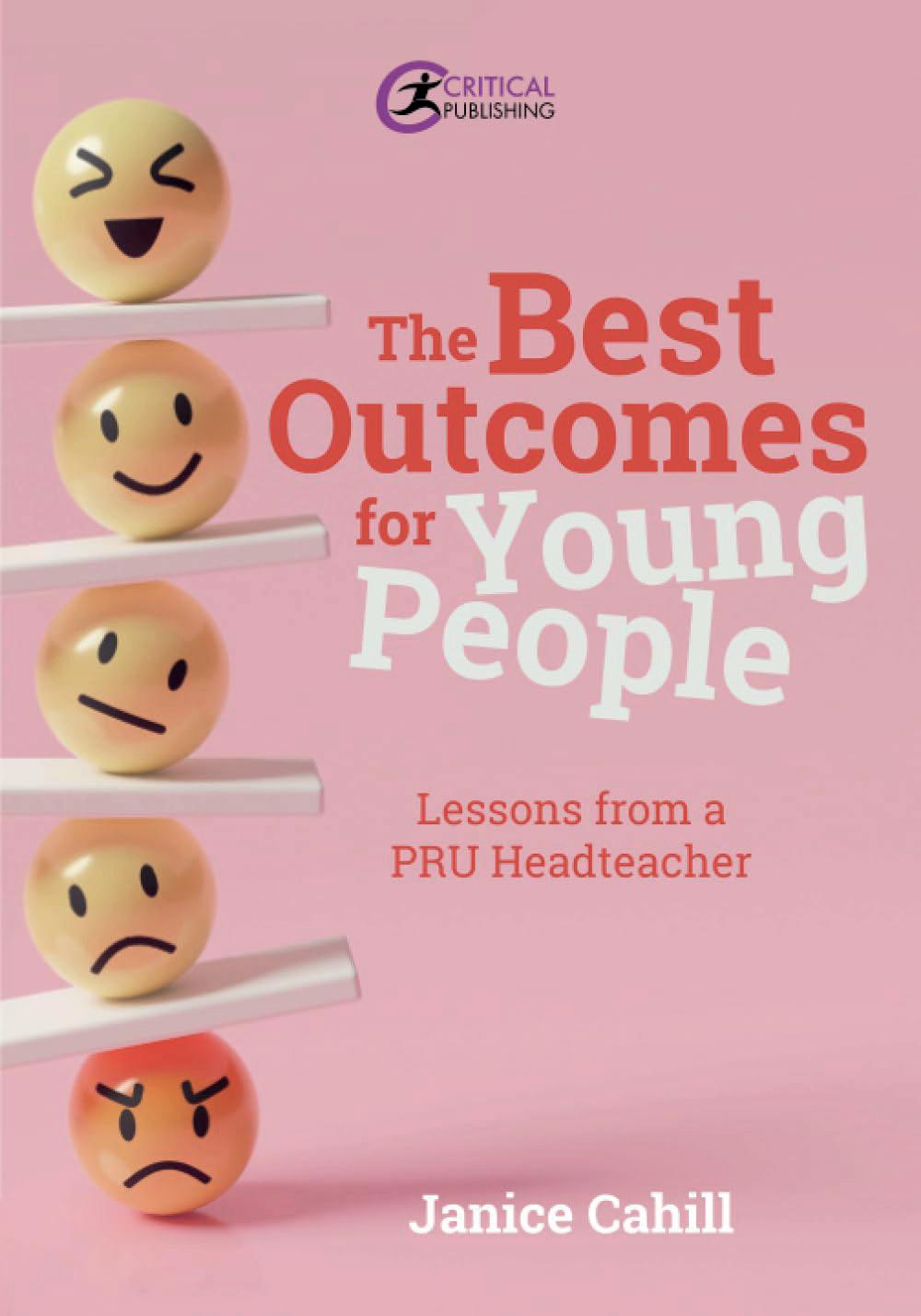
recognises the complexity of mental health provision in education. Expert research, workable strategies and evidence-based ideas empower teachers and senior leaders in revolutionising mental health provision for their students.
Another series worth a look is Practical Teaching. These books are written by



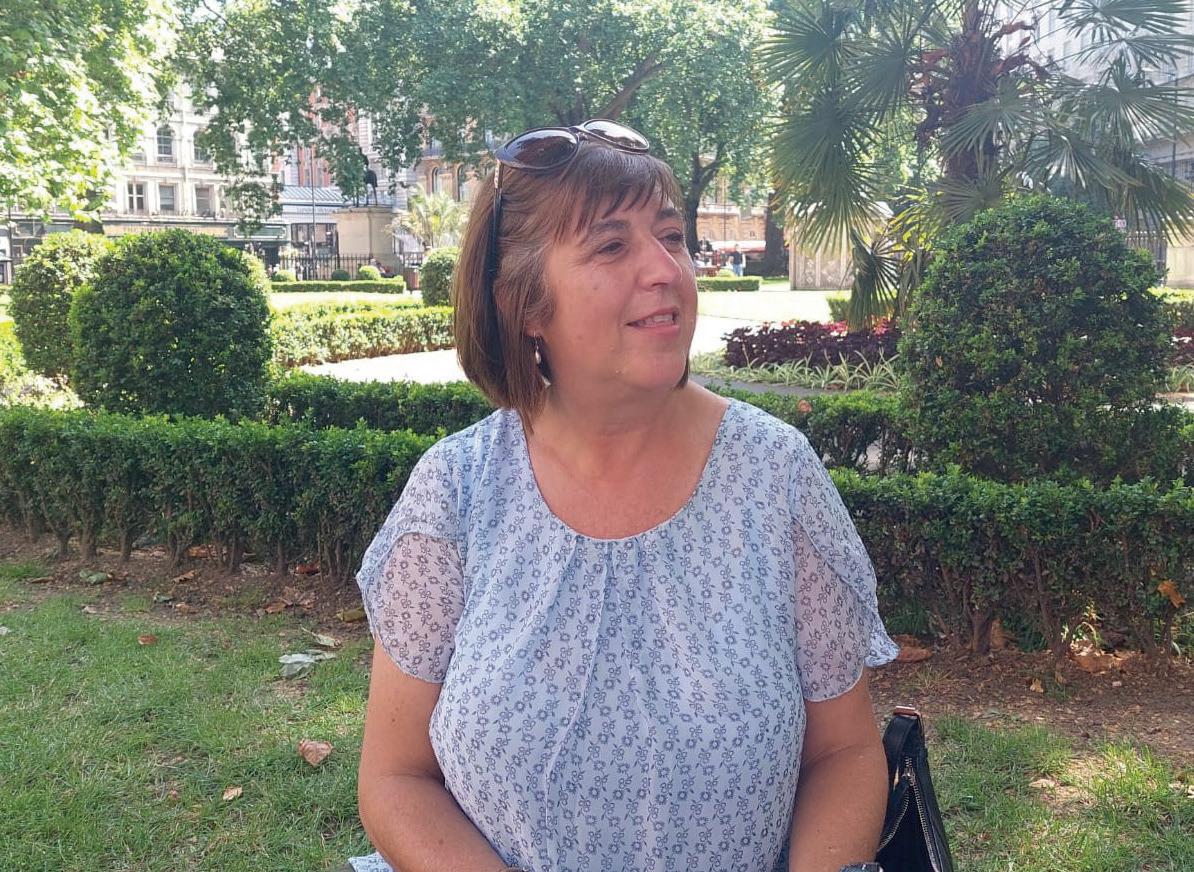
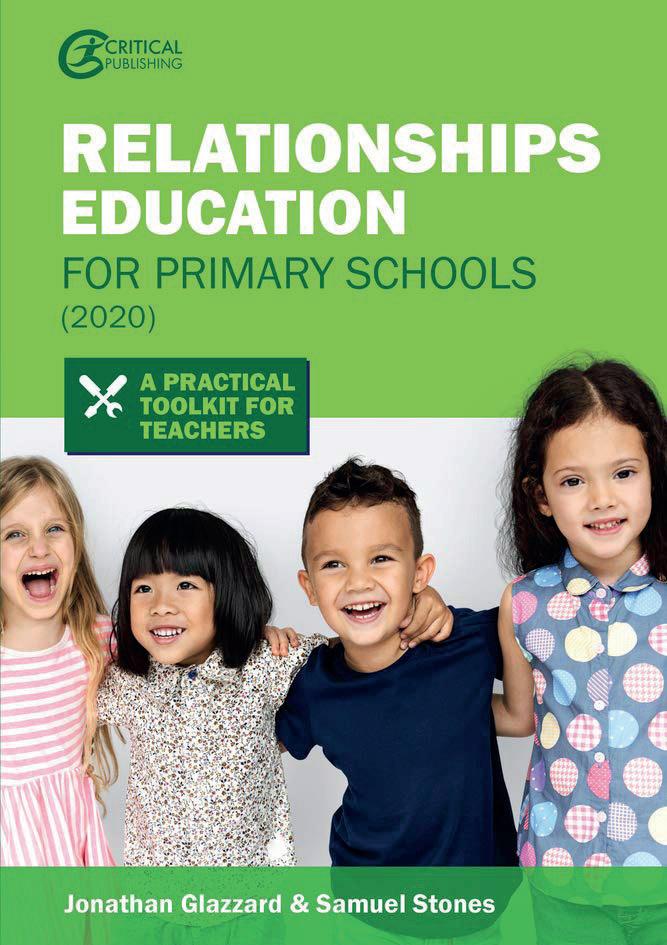

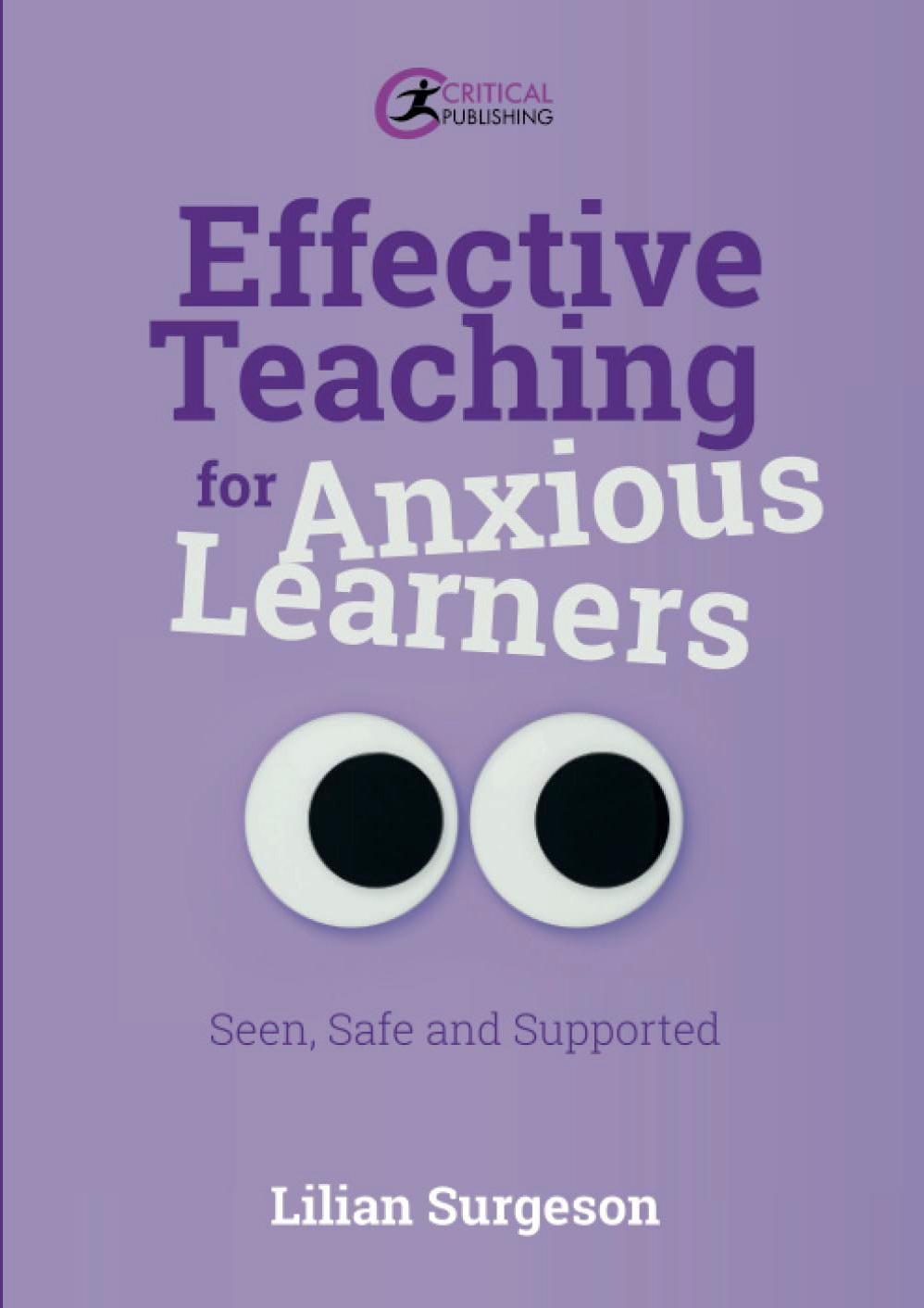

teachers and senior leaders for teachers and senior leaders! Our Practical Teaching series covers a diverse range of topics from supporting well-being of school staff and yourself to change of management. These dynamic and carefully crafted texts serve as valuable companions for teachers to make their job easier and more satisfying, whatever stage they're at in their career. When it comes to supporting children's development, you'll find plenty of inspiration from our books.


1
Comprehensive PSED Curriculum:
Put simply, our Early Years programme helps to fulfil the requirements for effective teaching of the Personal, Social and Emotion Development (PSED) curriculum for early years. Each subscription includes 40 topics, with a variety of immersive resources that help to encourage a healthy approach to teaching children’s wellbeing.
2
Engaging and Interactive Content:
Thanks to our colourful graphics, interactive activities and engaging storytelling, we’re capturing the interest of young learners to keep them excited when learning important social and emotional skills. This includes a new series of interactive games, which are made up of talking and sorting activities.
Designed to support visual learning and great for encouraging organic discussions, our sorting and talking games now include:
• Managing a new addition to the family
• Helping others
• Car travel safety
• Managing anger
• Managing separation anxiety
• Understanding autism Access and trial our taster pack by clicking on the link.
3
40 Read-To-Me Books for Early Years: Our library of books for children in early years follows the RainbowDrops, Blue, Purple, Pink, Red, Orange, Yellow and Green as they learn about the world around them. Available both in-print and digitally animated versions along with read-to-me options, our books are a hit with teachers and pupils alike.
Did you know that for every school that signs up to our online school subscription before the end of the academic year can receive a set of 40 complimentary PSED Books for EYFS?
Hurry, this promotion is due to end soon! Claim your PSED Books for EYFS, here.
4 FREE App for continued home learning: There’s only so much time in the school day and we recognise that
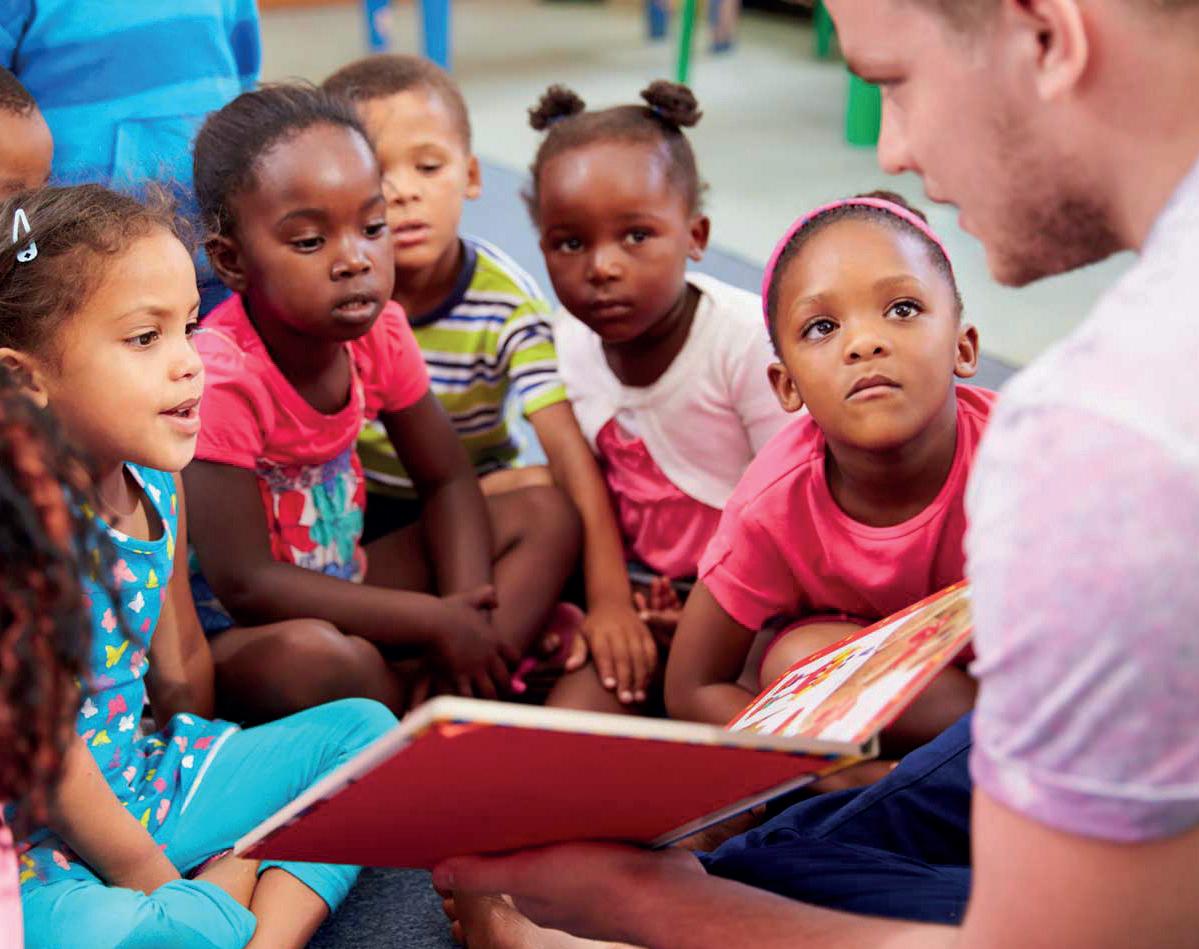
many of life’s lessons are learnt outside of the classroom. The RainbowSmart app is free for parents and carers to download and available on IOS, Android and all smart phones and tablets. This apps helps to continue PSED education at home.
5
Less than £4 a week! Adding Early Years to your bank of PSHE Primary Resources will save you money and time. For less than £4 a week, schools can enhance outcomes for children whilst reducing planning time too.



There can only be one winner. And, as we enter our FINAL month, we’re explaining why you’d be mad to miss out, what our previous winners are saying and how –even if you’re already a 1decision customer – you can be in with a chance of bagging a full subscription for a year.
We’re nearing the end of our 1decision giveaway, which offers a year’s full subscription to our award-winning resources for schools and teachers seeking additional personal development resources.
Running from mid-March through to mid-July and the end of the 2023/24 school year, our popular competition offers schools a chance to win a full year’s subscription to our highly-engaging PSHE materials, which support teachers in delivering comprehensive personal development for primary school pupils. We’re encouraging all primary school educators, including our current 1decision schools to enter to WIN a free year’s access to our PSHE resources. So far, the turn out has been promising with entries now reaching triple figures.
Winning schools will gain a full year’s 24/7 online access to our engaging downloadable resources, inclusive of alternative-ending videos and animations:
• 80 PSHE Topics for Primary
• 40 EYFS Topics to Support PSED
• Covers the Statutory RSHE Requirements
• Whole School Training Portal
• Teacher & Parent Zone
• Assembly Packs for Awareness Days
• Individual Pupil Assessments and More!
WHAT OUR WINNER’S SAY:
We spoke from Liz Redfern, our March winner, from Langmoor Primary and Jessica Wright, our April winner, from Lapford Primary School to see how they feel about their winnings.
"What a great prize to win I am sure there will be lots of great resources we will use as a school throughout the year. Thank you 1decision." Liz Redfern, Langmoor Primary School
"We are absolutely delighted to have won and can’t wait to start using the resources." Jessica Wright, Lapford Community Primary School.
As both Liz and Jessica are at the beginning of their 1decision journey, we’ve made a note in our diaries to check back for further feedback next year. In the meantime, if you are searching for feedback from our veteran 1d customers (so to speak), check out Amy Swinburne’s school case study on page 32 Alternatively, feel free to contact our friendly sales team who are on hand to help through info@1decision.co.uk
DON’T MISS OUT:
To conclude, we believe our #MidMonthMadness competition is more than just a giveaway; it’s an opportunity for schools to enhance their PSHE curriculum and foster a supportive learning environment. With a full year’s subscription, winning schools gain access to a wealth of resources that promote holistic personal development. As we continue through the competition, we look forward to hearing more success stories from schools across the UK. Enter the competition today at 1decision Giveaway and join the movement towards better PSHE education in primary schools.
Our final competition is now open for entries and closes on 22nd July 23.59pm. Good luck everyone!


We’re pleased to introduce you to our new interactive tour, which guides all busy primary schools, teachers and PSHE leads through our lovable suite of super-engaging and easy-to-understand resources for outstanding personal development teaching in the UK.
We made it to save you time. Simply log on, sit back and follow the steps via our helpful on-the-screen guide. Keep being interrupted? No problem, we’ve designed the interactive tour to work around you, so you can pause, rewind and replay to your heart’s content.
This is not just for new customers - If you or any of your PSHE team are feeling a little rusty when it comes to navigating around the 1decision resources, the interactive tour may be of help.
Did you know sharing is caring?
Do you know a primary school that would benefit from adding 1decision to their personal development and PSHE provision?
Great! We’re offering a £75 Amazon voucher for spreading our word, plus a 10% first-year discount for the new school that signs up. Well, sharing is caring after all.

1decision customers are invited to enjoy 50% funding of SchoolTV to help bridge the teaching and communication gaps between schools and parents/carers.
The latest National Parent Survey, conducted by YouGov, paints a stark picture of the mental health and wellbeing challenges faced by young people, with parents too often feeling uneducated and left alone to deal with the issues.
Our partners from the Mental Health and Wellbeing organisation, SchoolTV, aim to:
• raise awareness to ultimately change the current state of youth mental health;
• use technology to reduce pressure on schools when providing support for pupils and the growing need to engage parents; as well as
• drive important conversations from the home.
We’ve partnered with SchoolTV to offer all 1decision schools a 50% discount on their subscriptions.
Read more on page 36.

As you read these very words, isn’t it exciting to know that The National Read-Aloud Challenge 2024 is fully underway? Just think for a moment about how many children are having their minds blown with iconic imagery, individually selected and tailored tales from every realm, and stories of all shapes and sizes that will hopefully entertain for generations to come!
If you hadn’t guessed, we’re fully behind our partner, Fonetti and their inspiring readathon for children aged between five and 11 years old.
Open from 1st June – 31st August 2024, Fonetti are asking children to commit to reading as many books as they can for the National Read-Aloud Challenge. To support, we’re asking primary schools and teachers - like you – to spread the word and help to encourage a lifetime love of literature in the process.
By using the advanced Fonetti’s app technology, pupils are encouraged to repeat words or sentences that were indistinguishable and are given support throughout each story. Teachers as well as parents/carers can view status reports and track reading progress digitally, so are always informed and aware of pupil’s progress as well as genre preferences.
An all-expenses-paid trip to an Awards Ceremony at Amazon HQ in London with Clare Balding OBE.
Find out more, enrol your school or register your child now for a summer full of reading adventures.

RSHE
The government’s latest draft guidance for RSHE in primary schools asking for your views on the proposed changes to the relationship, sex and health education in the UK, including:
• Relationship and sex education policies in schools
• Openness with parents regarding planned-use of RSHE resources
• Age limits on teaching topics and materials
• Flexibility regarding age limits
• Sexual orientation
• Gender reassignment
• Addressing prejudice, harassment and sexual violence
• Primary sex education
• Secondary teachings and more
The DfE has confirmed that despite the upcoming election on 4 July, the consultation will remain open for submissions until the 11th July 2024 deadline.
RSE School Policies
All UK primary schools by law require a policy for relationships education, while secondary schools need a policy for relationships and sex education. The government are now requesting changes to the guidance on schools’ policies for relationships and sex education, including asking schools to:
• differentiate between relationships and sex education (if they teach sex education) so that parents are clear about the content they can request withdrawal from.
• explain how they will handle questions from pupils in relation to content that is restricted to older children, that relates to topics in primary sex education that the school doesn’t cover or relates to sex education from which the pupil has been withdrawn.
We’ve made changes to our Personal Development Quiz! Our Developer Om has been busy improving the layout of our PDQ to enhance functionality and your user experience. Starting with the visuals, he’s updated each section with relevant imagery. We have also updated the dictation. Because it’s such a comprehensive quiz and we didn’t want to miss anything out, we decided to split this into two parts. This means that teachers can spread the assessment across lessons. Each quiz takes around 20 mins. Capturing data that matters!
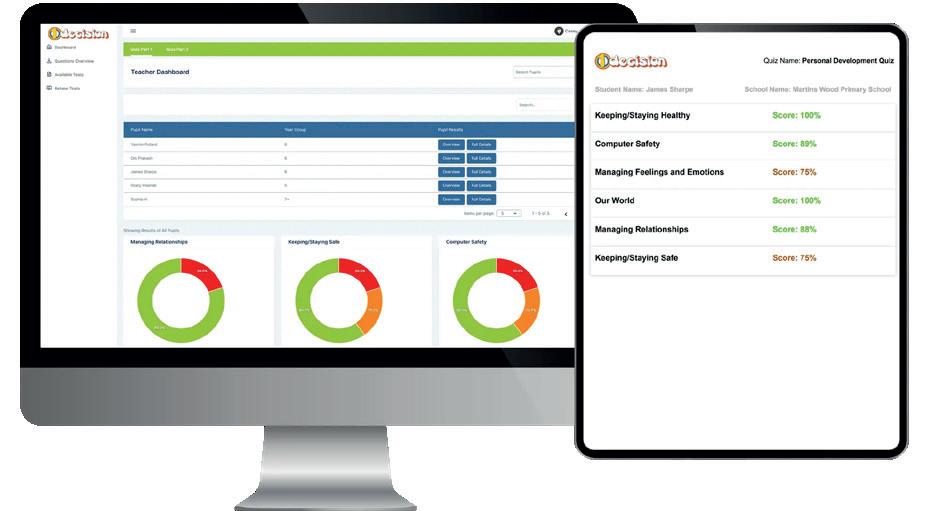

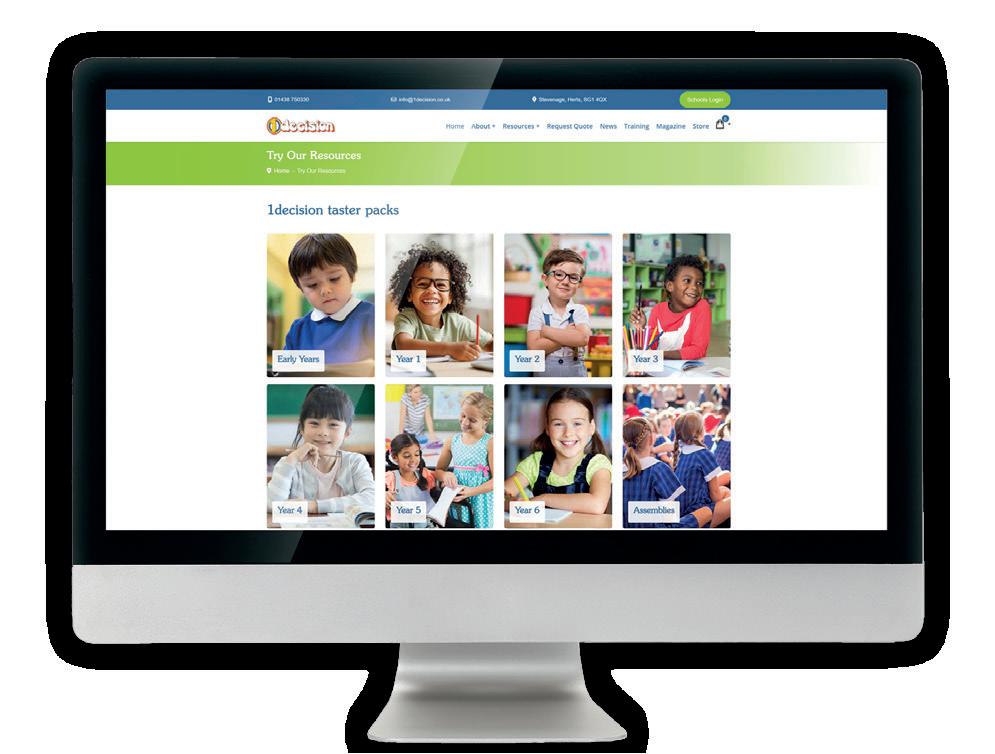
In terms of primary sex education, the new guidance proposes: ‘…that where primary schools choose to teach sex education, its purpose is not to prepare pupils for sexual activity in later life, but to focus on giving pupils the information they need to understand human reproduction and for their own safety. Primary schools should take account of the age restrictions in the secondary RSHE curriculum tables.
It recommends that:
‘…primary schools have a sex education programme but restricts this to no earlier than years 5 or 6 and is clear that if a primary school teaches sex education, it should draw on the knowledge pupils are developing about the human life cycle, as set out in the national curriculum for science.
The consultation asks:
Do you agree with the restriction on teaching sex education only in years 5 or 6?
Yes / No
Don’t miss out on submitting your voice and complete the RSE consultation questionnaire before 23.59 on the 11th July 2024. Head to https://consult.education.gov.uk/rshe-team/ review-of-the-rshe-statutory-guidance/
OFSTED’S BIG LISTEN SUBMISSIONS ARE IN!
The Big Listen closed for submissions on 31 May 2024 at 11:59pm, whereby Ofsted asked for opinions on where the priorities lie and what’s important to teachers, senior leads and parents/carers. Watch this space…

THE BIG AMBITION FINDINGS
Dame Rachel De Souza’s Big Ambition was a government-led initiative, which asked for views and commentary from UK children, parents and carers. Has the ambition been met?
According to Children’s Commissioner, Dame Rachel De Souza, one of the biggest takeaways includes the statistic that ‘one in five children feel they are listened to by politicians’…
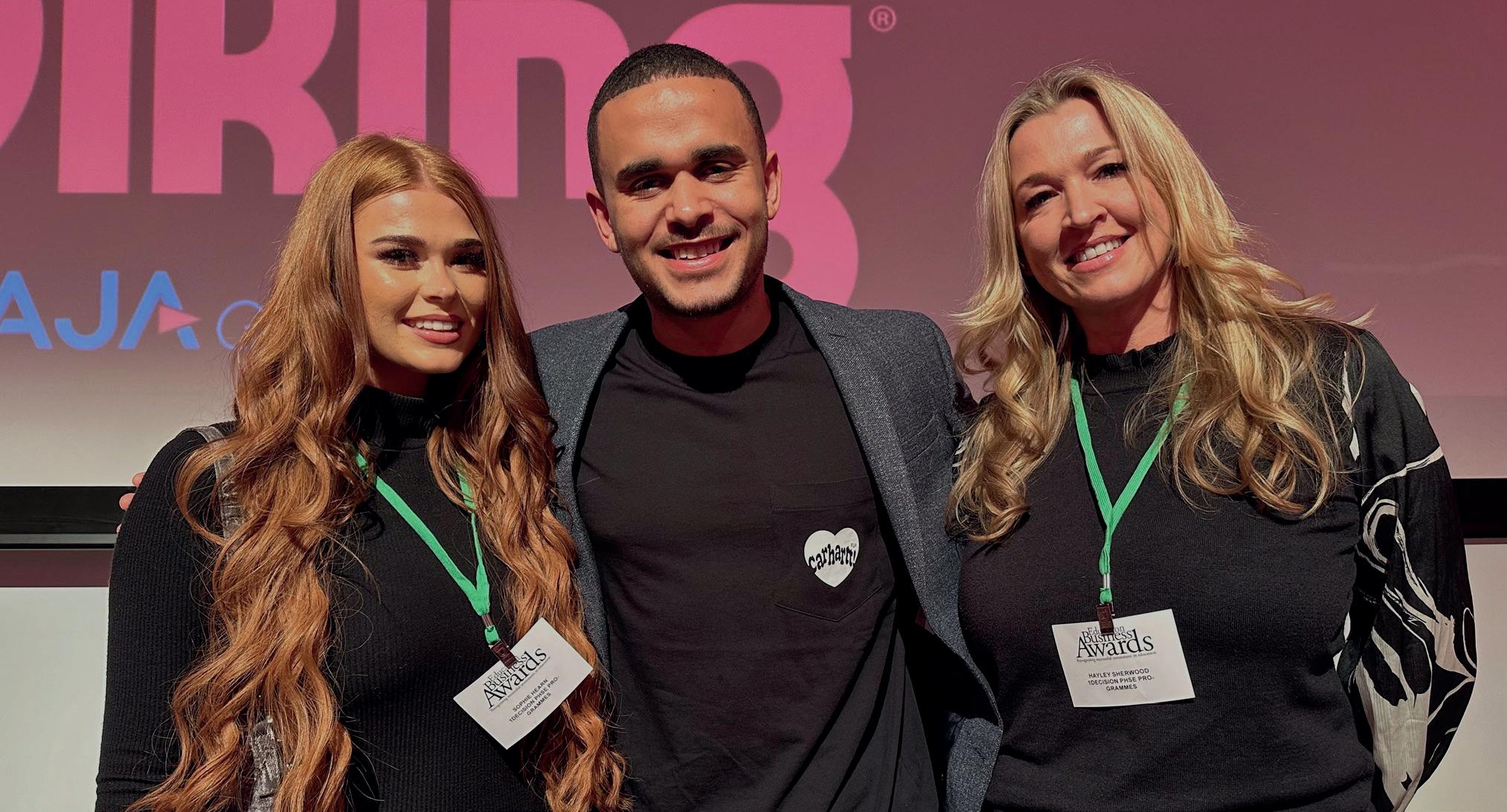
EDUCATION BUSINESS AWARDS 2024
It’s Not the Winning That Counts... Award Update: You win some, you lose some. In this case, it was definitely the taking part that mattered; we still had an amazing day at the Education Business Awards ceremony on 12th June 2024.
Despite not winning the award for our category, it was great to be shortlisted for the Educational Resource Award for Primary and have the chance to connect with likeminded people and companies.
PSHE and personal development education needs more attention and spotlight in our classrooms. It was great to see others waving the flag for personal development as well as highlighting the increasing need to put this in front of all other curriculum areas. Personal development is starting to get the attention it deserves!
By participating in such award ceremonies, we continue to emphasise the fundamental importance of providing highquality and engaging life-skills resources and PSHE teaching material. We’re so grateful to be involved and wish to thank the organisers for facilitating a space for worthy work to be celebrated.
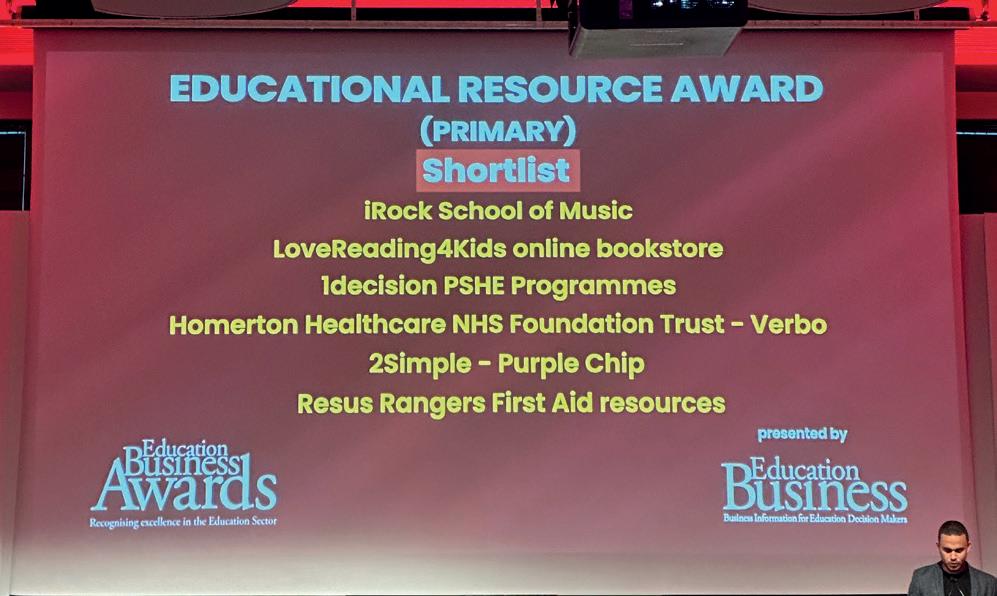



We love to see and hear how 1decision is supporting schools in delivering outstanding PSHE and personal development to pupils across the globe. If you would like to share feedback or pictures of your displays, please connect with our socials or send to morgan@1decision.co.uk




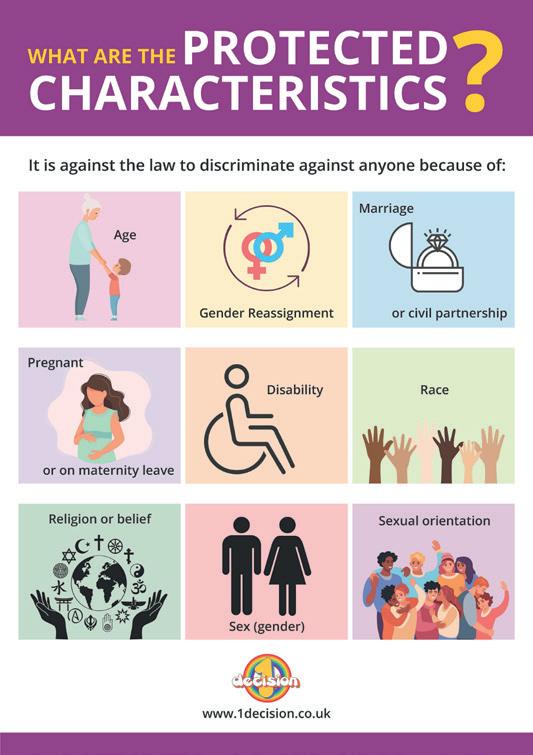
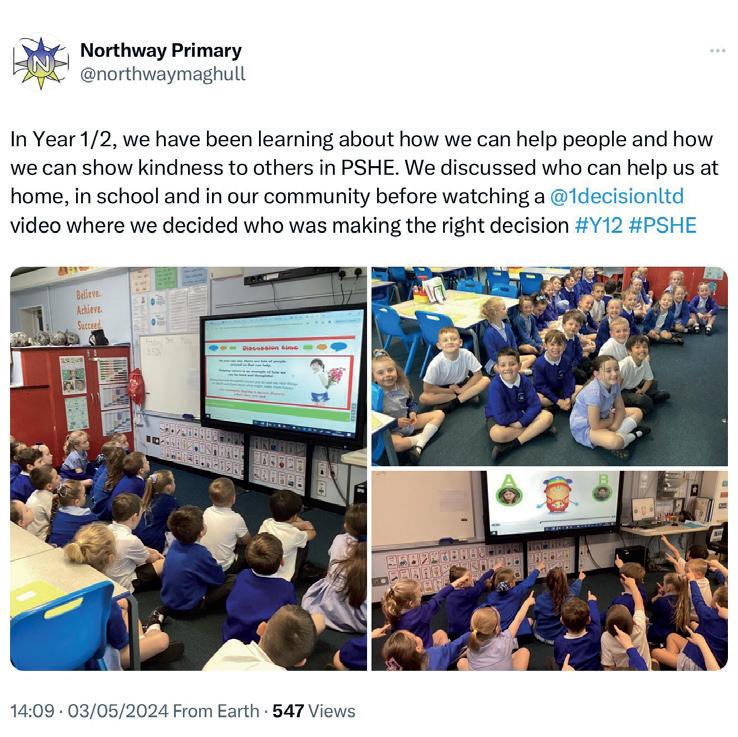
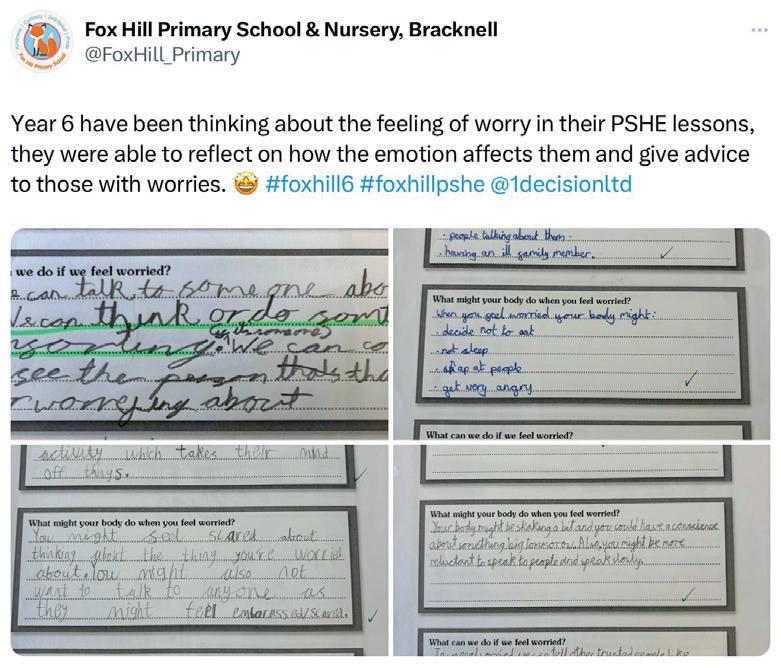
If you would like more support to evidence your pupils work, you can now download our A3 posters. These can be found in the Teacher Zone


Back for a second year, the popular National Read-Aloud Challenge 2024 is now underway. Vicki Edgar, Head of Customer Success at Fonetti, tells us more.
WHAT IS THE NATIONAL READ-ALOUD CHALLENGE 2024?
It’s a summer reading challenge that encourages children aged from five to 15 to read aloud over the school break. By entering, schools and pupils will gain free access to 100s of engaging books on Fonetti’s award-winning reading platform until the end of competition.
Ideal for the school holidays, this challenge supports continued learning and helps to prevent a summer of little-to-no reading practise by incentivising pupils, parents
and schools. Aiming to avoid summer reading regression, the National ReadAloud Challenge 2024 also helps to:
• boost children’s confidence,
• sharpen speech, vocabulary and comprehension skills; as well as
• develop a love for literature they can share
Supervision-free, Fonetti’s fun app is designed to sharpen their skills over the summer holidays.

HOW DO WE GET INVOLVED?
Simply click on the link below to enrol your school. Once registered, you’ll receive a link to a personalised web page for your school. There you’ll find the NARC 2024 promotional pack with ready-to-use templates to further help spread the word of the challenge to children, staff and parents & carers.
TO ENROL YOUR SCHOOL Click here
WHAT’S IN IT FOR THE CHILDREN?
Children can access the Fonetti app library for free for the duration of the whole challenge, as well as having the chance to achieve certificates signed by our brand ambassador Clare Balding CBE, appear on the National Read-Aloud Challenge online leaderboard and win some incredible prizes. It’s the perfect way to encourage children to improve their reading skills, fluency and confidence.
WHAT’S IN IT FOR THE SCHOOL?
As a school, children will work together as a team during the challenge to read as many books as possible. This will give your school the chance to win a FREE London trip at Amazon HQ to an awards ceremony hosted by Clare Balding CBE, for two teachers and the top two performing pupils.
"It’s the perfect way to encourage children to improve their reading skills, fluency and confidence"
Share the challenge to all schools within your Trust for some fun inter-MAT competition, as your schools compete against each other on the online leaderboards, as well as work together as a team for a shot at winning the National Read-Aloud Challenge MAT award. Good luck!


Head of Customer Success
WHY FONETTI?
As a passionate advocate for children’s literacy and self-confidence, I understand the impact that dyslexia had on my own life growing up. Now, I’m committed to changing lives through Fonetti. The joy of seeing children’s confidence soar as they interact with the app is beyond incredible; it simply reaffirms my passion for helping those facing similar struggles that I once endured. My journey has been supercharged by Dyslexia. As a mum to a son with ADHD, ASD, and Dyslexia, my purpose in life is dedicated to empowering neurodiverse children.




We are delighted to collaborate with Fonetti for the National Read-Aloud Challenge By raising awareness and helping children improve their reading skills, this summer initiative will undoubtedly boost confidence and self-esteem among our children. We are excited to see the positive impact this challenge will have again this year
Hayley Sherwood Managing Director, 1decision

Friday 12th July 2024
Remote Training via Zoom.
Start 9.15am. Finish 3.00pm.
Cost: £100 per delegate.
"Almost a third of young people in the UK experience trauma during childhood or adolescence, which doubles their risk of experiencing a range of mental health disorders." The Lancet Psychiatry, 2019.
Trauma acts as a barrier to positive attainment for many children. Those who have experienced adverse childhood experiences (ACE) e.g. trauma, have one of the lowest rates of attainment in education and have a high vulnerability to develop clinically significant psychological difficulties that can continue with them into adulthood and beyond.
"In children aged 7 to 16 years, rates of probable mental disorder rose from 1 in 9 (12.1%) in 2017 to 1 in 6 (16.7%) in 2020. Rates of probable mental disorder then remained stable between 2020, 2021 and 2022." NHS Digital (third wave).
"On average it takes a child 10 years to receive help for a mental health problem." The Centre for Mental Health, 2015. Education is on the frontline and best positioned to make a difference. "Appropriately trained and supported education staff can achieve results comparable to those achieved by trained therapists in delivering a number of interventions addressing mild to moderate mental health problems." Government
Green Paper, 2017, Transforming Children and Young People’s Mental Health Provision.
Parents often come to teachers for help; understanding and training is a necessary first response to best support staff in education to support children and their families.
"Without trauma informed training, teachers may be ill equipped to recognise and respond appropriately, unwittingly contributing to trauma, or re-traumatising a child. This can happen through inappropriate behaviour management strategies, or school environments that exacerbates the child feeling unsafe" Trauma Informed Schools UK.
Our training package provides education staff with knowledge and skills in:
• Understanding development trauma and its impact on relationships, brain development and functioning, emotions, thinking, regulation and behaviour.
• The importance of a whole-school approach to increase a shared awareness and understanding of developmental trauma to aid informed consistent responses and support.
• Clinically proven, psychologically informed therapeutic methods to build positive connections/relationship and support traumatised and distressed children, which will enable them to better access their learning, experience positive wellbeing and reach their potential.
• Taking care of yourself to take care of others.

Dr Louise Egan (Clinical Psychologist) has over 19 years’ experience of working as a highly skilled and knowledgeable Clinical Psychologist across the age range for the NHS, children’s social services, independent and charitable sectors. She has specialised in child, adolescent and family clinical psychology. She was also a Clinical Tutor and Senior Fellow at Manchester University, where she trained trainee clinical psychologists and their supervisors in their work for the NHS. She is currently Managing Clinical Director at Encompass Education Support Ltd and works as Director of Clinical Excellence and Safeguarding Lead for a leading tech-health psychological therapies company called HelloSelf. She is a skilled and engaging clinician and trained trainer with extensive experience of offering training to multi-disciplinary professionals (health, education and social care) in the public and private sectors.
Mr Kevin Egan has been a primary school teacher for the past 14 years. He is a Key Stage 2 lead and Designated Safeguarding Lead. He has specialised in Special Educational Needs and has the National Award For Special Educational Needs Coordination. He is also a Mental Health First Aider. He has a proven track record of successfully delivered highly regarded and engaging training over the past four years to school staff across the country in his role as Managing Director of Encompass Education Support.
Approach: Both Kevin and Louise are trained in scientifically proven techniques which are underpinned by robust specialist psychological and educational knowledge and research. Their practice-based evidence also enables them to share the important practical application of theories/ research in a skills-based meaningful way. Their unique and highly regarded services and training aims to encompass the biopsychosocial and educational needs of children and adolescents to best support them to positively thrive.
Previous feedback:
‘A positive approach to mental health and how upbeat both presenters were - a breath of fresh air - as schools are hard places to work in at this present time.’ Laura Francis – Cupernham Junior School
‘Thank you so much for Friday’s training. I have completed some courses around trauma informed education and found this course to be even more informative and relatable.’ Sarah Brown, St Laurence Primary School, Ludlow.
‘All training was very informative and interesting. Some great ideas to share back in school and it was good to talk in the breakout rooms and share ideas so you are
We are an independent education support company offering high quality support to schools through an experienced Clinical Psychologist, SENCO, Mental Health First Aider and primary school teacher. We offer multidisciplinary services such as specialist educational needs consultation and psychological assessment, therapy, training, consultation and supervision across the United Kingdom. For example, we regularly offer Mental Health Awareness, Building Self Esteem in EYFS and Staff Wellbeing training to schools across the UK. We also offer supervision to senior leaders and all teaching staff in education. www.encompasseducation.co.uk
not alone.’ Sharon Reece, Holden Lane Primary.
‘I really liked that there was opportunities for self reflection and ideas for action planning to support staff at school. I felt that the course was really well planned and gave participants opportunities to reflect and share.’ Mrs Stevie-Jane Bodé, Ocklynge Junior School
‘The training was very relevant to me and I like how it covered a wide range of important material and current issues in enough detail at a good pace.’ Vicky Brown – Knowsley Central School
‘Concise, wide range of content, delivered by experienced professionals. Sharing ideas and resources that can be used in school.’
Janet Mackey, Harlaxton CE Primary School
‘The content of the training material and how it was delivered was of an exceptionally high standard.’ Louise Watts of Holy Trinity C of E School, Gravesend
'Very powerful and engaging CPD – I will look out for your courses again.
‘I really enjoyed the structure of the session – not just listening to your delivery (but as
trainers you were engaging and relatable too); there was a good balance of breakout rooms; videos and diagrams to enhance the content discussion.’ Mrs Laura Robson of Bromley Sunnyside Junior School, Rotherham
‘I have found this training to be the most effective and informative in quite sometime’ Rachel Seedall, Balshaw’s C of E High School
‘Louise and Kevin presented really well and were an excellent balance of clinical and classroom-based experience. The course covered all I hoped it would in terms of background, data and (most importantly) strategies to be used in school.’ Jo Turner,Newnham Croft.
Encompass Education Support Services: let us help guide the way.



We spoke to Year 3 primary teacher, Amy Swinburne to discover how our PSHE and personal development resources are supporting schools, pupils and parent/ carers.
William Ransom is a two-form entry school with 421 children currently enrolled. As a progressively diverse school, 19 different cultures are represented in their pupil demographic. William Ransom is a values-based school, where children are encouraged to develop an understanding of the important qualities in life, including kindness, honesty, thoughtfulness and resilience.
By advocating for such values, teachers can help to support and encourage healthy pupil friendships and relationships that could last a lifetime. The staff at William Ransom believe every child has the potential to be whatever they want to be. They have high aspirations and focus on fostering confidence in all pupils. Laying the foundations to secondary education, they fulfill their responsiblities as a
primary school through a varied and open-minded approach to learning.
Let's hear more about how they're improving PSHE and personal development provisions from Amy Swinburne, their current PSHE lead.
Amy, how has 1decision supported you as PSHE lead?
1decision has supported me hugely as a PSHE lead. It has given me lots of tools to start analysing the position of PSHE in the school - pupil voice and staff questionnaires - the supporting documents available as part of the teachers' training area have been invaluable and I feel so much more confident using 1decision to deliver PSHE across the school.
Does 1 decision reduce planning time?
1decision has significantly reduced the planning time that staff are taking. The resources are so easy to access with prepared slides. The children absolutely love the videos and really look forward

to them as a discussion point in lessons. Teachers report that they feel happy and confident when using these resources.
How does 1decision help with primary school Ofsted inspections?
When we had our last Ofsted inspection, we were not using 1decision, but I feel confident that if ofsted came knocking we would be able to present them with a really comprehensive understanding of our PSHE curriculum and that is down to the resources 1decision provides.
How does 1decision positively impact pupils?
I have been lucky enough to spend time with lots of pupils across our school as part of Pupil Voice and they always rave about the 1decision videos. They talk about the characters- children can remember from years back – children falling out of windows or tying shoelaces or whatever the theme and topic might be. I think it makes them more confident in articulating themselves using the vocabulary when refelecting on their safety or health.

"I would definitely recommend 1decision to other schools looking for a simple-to-use and comprehensive PSHE, RSHE and personal development programme"
Would you recommend 1decision to other schools?
I would definitely recommend 1decision to other schools looking for a simple-touse and comprehensive PSHE, RSHE and personal development programme.
Which additional benefits does the 1decision Whole School Training Portal offer?
We, just this year, accessed the training portal for the first time. I have thoroughly enjoyed undertaking the units for PSHE lead and I feel much more informed than I did before. I look forward to using some of the resources as part of staff meeting time with everyone else- to share some of
the knowldege. We are very lucky here to have 1decision as a tool for informing our practise.
A huge thanks to Amy Swinburne, William Ransom and all other schools and teachers who are currently using 1decision resources to engage and educate the future generation on life skills, PSHE, RSHE and personal development. Thank you for your dedication, hard work and care, we couldn't do it without you!
If you are a current subscriber and would like to share your experience of 1decision, please contact sophie@1decision.co.uk
Current Year 6 teacher and PSHE lead at William Ransom Primary School in Hitchin, Herts. Been a teacher since 2009 and have experience teaching all age groups EYFS to Year 6 (using both Scottish and English curriculums) as well as spending a little time in specialist SEN provision. Amy loves teaching and is passionate about netball!

At 1decision, we believe in preparing children for all of life’s adventures, big and small. We’ve seen first-hand that engaging PSHE education can teach our young learners the tools and lessons for a happier, healthier and more harmonious life.
First aid is no exception. Interestingly, results from our pupil Personal Development Quiz, show that first aid is an area where confidence and knowledge are particularly low. That’s why we’re focusing on the top ways to teach first aid in primary schools.
Teaching first aid to children is not just showing them how to bandage cuts and scrapes; it’s about creating the knowledge and awareness of responsibility – or rather - ‘response and ability’, which helps to build children’s confidence and selfesteem.
Let’s explore why teaching first aid is so crucial and look at the top PSHE resources, which support enjoyable and effective education for primary schools.
WHY TEACH FIRST AID?
• Cultivate children’s confidence and independence
• Encourage empathy and responsibility in primary pupils
• Instill the importance of safety, prevention and preparation
• Fulfill the statutory obligation for UK primary schools
• Save lives!
BUILDING CONFIDENCE AND INDEPENDENCE
Children who learn first aid gain a remarkable sense of confidence. Knowing they can handle minor injuries or respond in an emergency situation empowers them to take charge and act responsibly. Thankfully, it’s known to cause a rippleeffect, where confidence dissipates into other areas of their lives, helping them to face challenges with a positive, proactive, ‘can-do’ attitude.
ENCOURAGING EMPATHY AND RESPONSIBILITY
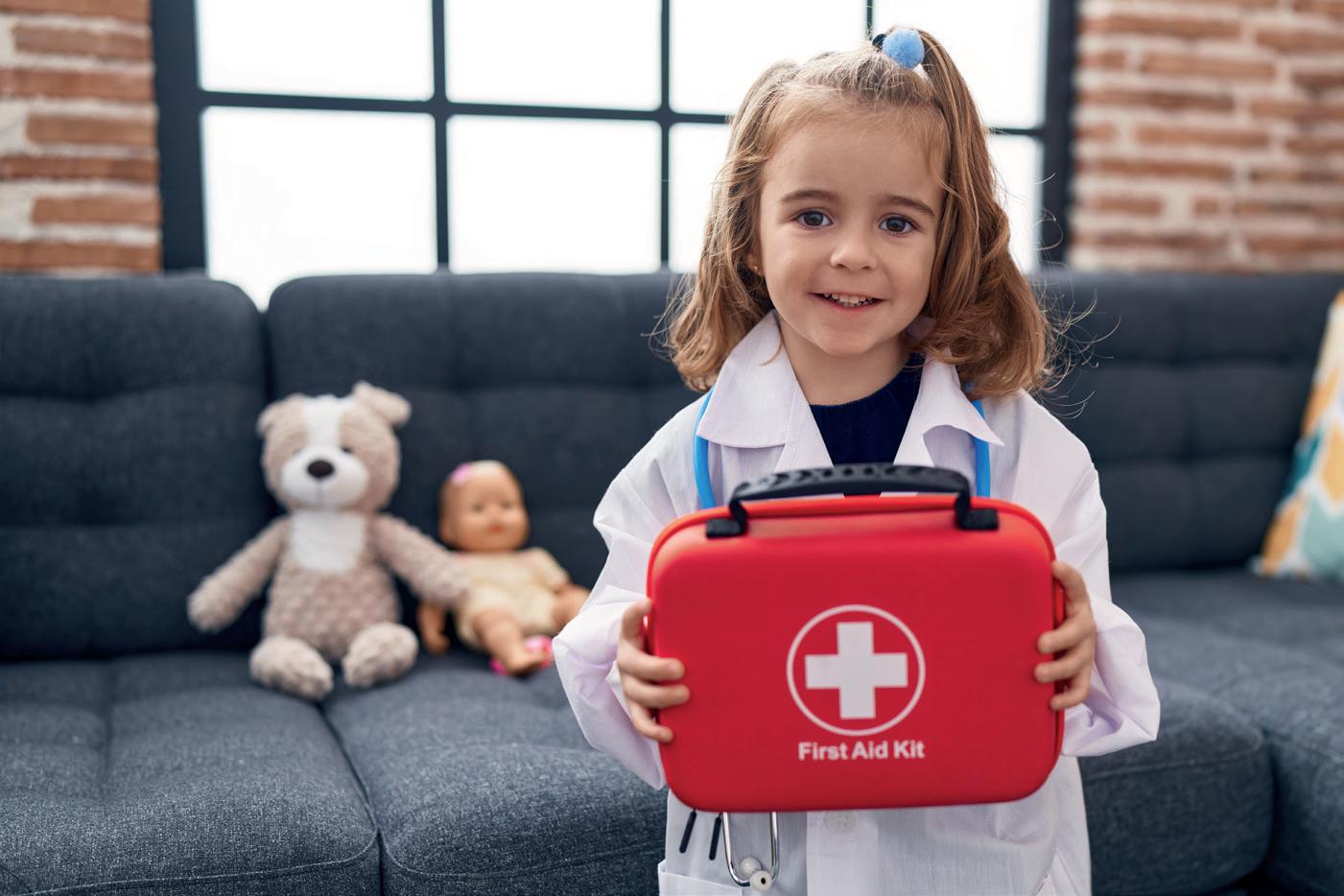
First aid training can help to instill a sense of empathy and responsibility in children. Not only are they learning how to look out for others and manage emergency situations with confidence, but also, by exposing them to potential scenarios –especially through the screen – they can understand more of the risks and how to avoid them to keep safe.
Teaching first aid through PSHE also helps to build attitudes of compassion and altruism, which means in other words, it’s seen as a fundamental element to developing well-rounded individuals who care about their communities.
SAFETY, PREPARATION AND PREVENTION
Accidents can happen anytime, anywhere. By teaching children first aid, we ensure they are prepared to respond effectively, whether they’re at home, in school, or out playing during the summer holidays. This foresight can turn potentially serious situations into manageable ones, reducing the severity of injuries and promoting quicker recoveries. Equally, by teaching first aid to children, they can become more aware of how to avoid dangers and keep themselves safe, thus reducing the pressures on emergency services and support.
PRIMARY SCHOOLS HAVE A STATUTORY OBLIGATION TO TEACH FIRST AID
Since September 2020, all state-funded schools in England have been required by law to teach Health Education. Within this, primary schools are obliged to include basic first aid teaching, for example, dealing with common injuries.
For more information on the legal requirements for PSHE primary curriculum teaching in the UK, click on the image below.



"From minor scrapes to more serious situations, knowing how to respond can make all the difference"
Making first aid education engaging and accessible is key to keeping children interested and motivated. Here’s our top first aid resource recommendations:
At 1decision, our interactive modules and alternative-ending videos are designed specifically to support primary school educators when teaching PSHE and
personal development. Our First Aid topics aim to instill confidence in young learners so they can act well in emergencies. From minor scrapes to more serious situations, knowing how to respond can make all the difference.
Try a topic for free - Our First Aid topic suggested for Year 5 pupils builds on the knowledge and skills they need to be heroes.

If you’re not already lucky enough to be using 1decision First Aid resources to teach your primary pupils, click on the image below to check out our YouTube compilation to find out more.

ADDITIONAL SUPPORT FOR TEACHING OF FIRST AID:



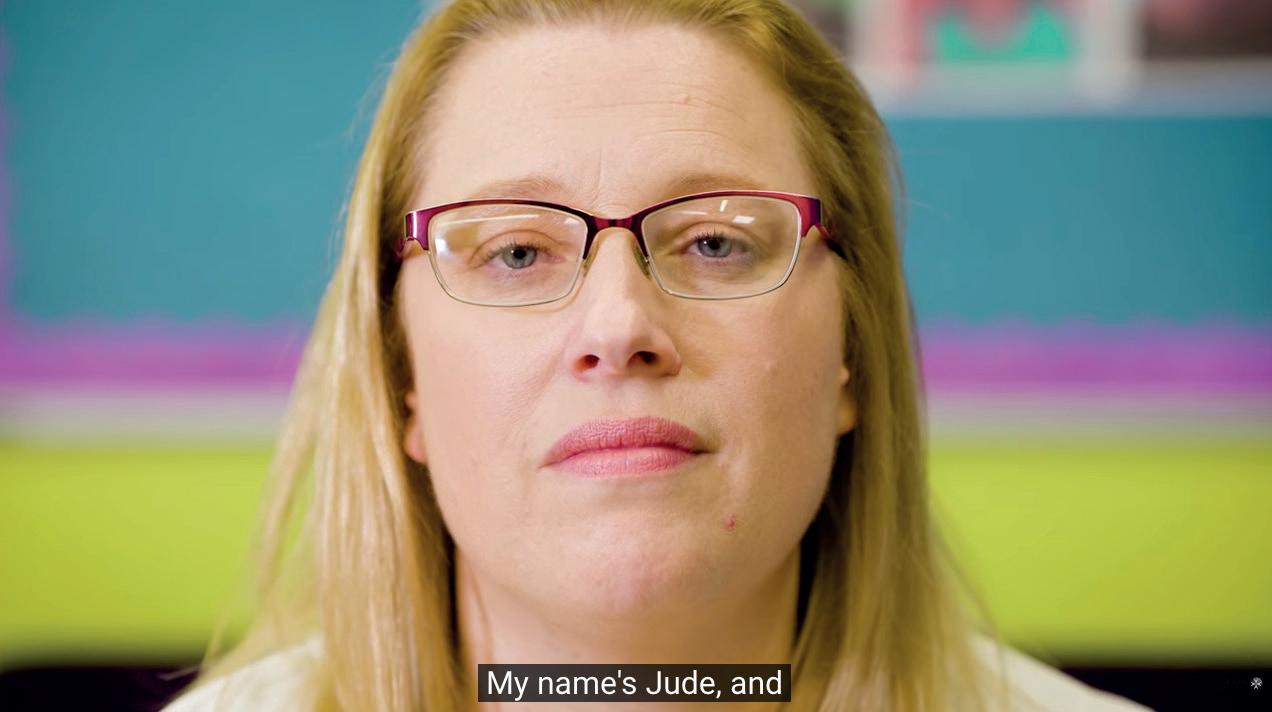
In today's fast-paced world, the role of primary schools extends beyond the classroom. It's crucial that primary schools support parents and carers in nurturing children's development at home. This partnership is vital in areas such as managing screen time, promoting healthy eating, and supporting positive mental health.
WHY ARE THESE TOPICS SO IMPORTANT?
Managing Screen Time
Screen time has become a significant part of children's lives, often overshadowing more traditional forms of play and learning. While technology has its benefits, excessive screen time can lead to issues such as:
• Reduced physical activity
• Disrupted sleep
• Impaired social skills
Primary schools can play a pivotal role by providing parents with strategies to manage their children's screen time effectively, helping to educate

parents about the importance of setting boundaries on screen usage. Practical tips include:
• Creating a family media plan
• Encouraging screen-free zones
• Promoting alternative activities like reading or outdoor play
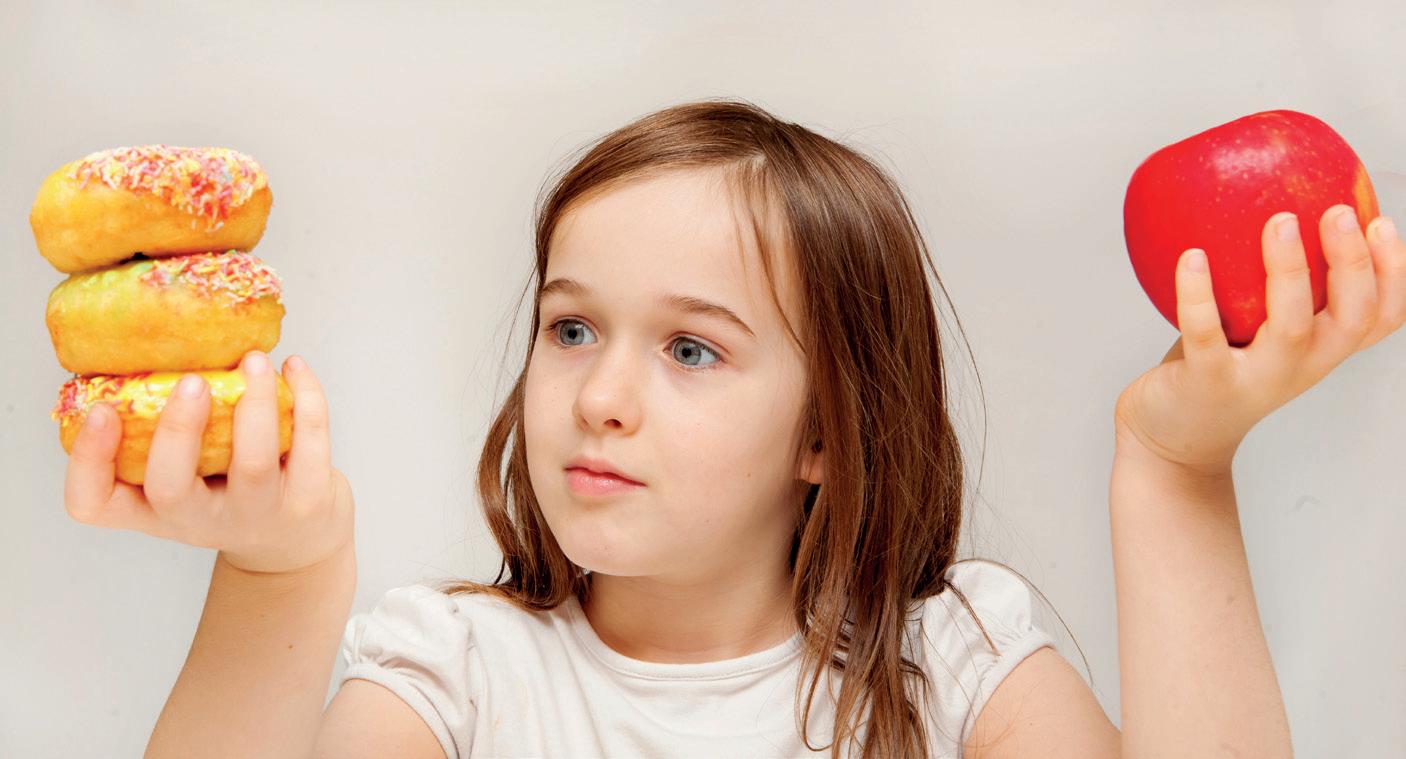
Nutrition is a cornerstone of a child's overall well-being and academic performance. Poor eating habits can lead to various health issues, including:
• Obesity
• Diabetes
• Concentration problems
Primary schools can support parents by providing resources and guidance on fostering healthy eating habits at home. Schools can share information to highlight the importance of a balanced diet rich in fruits, vegetables, and whole grains. Practical support includes:
• Cooking classes
• Nutritional information sessions
• Healthy recipe ideas
Positive Mental Health
Mental health is as critical as physical health in a child's development. Early childhood is a formative period for


developing emotional resilience and coping skills. Primary schools can support parents in nurturing their children's mental well-being by offering:
• Information on recognising signs of stress or anxiety
• Strategies for emotional support
• Encouraging open communication
• Counselling services and peer support groups
But how much time do primary schools have to support parents and carers?
The answer is very little which is why organisations such as SchoolTV are became an invaluable source for schools and their communities.
SchoolTV: A Comprehensive Resource for Parents and Schools
SchoolTV is an online platform designed to support schools by providing parents and carers with a wealth of resources to help them navigate the complexities of raising children in today's world. It aims to bridge the gap between school education and home support, focusing on the mental health and wellbeing of students.
Key Features of SchoolTV
1. Expert-Led Content:
SchoolTV offers content from leading experts in child and adolescent psychology, mental health, and wellbeing. This includes insights and advice from professionals like Dr. Michael Carr-Gregg, Dr. Laverne Antrobus, and Dr. Emma Woodward
2. Wide Range of Topics:
The platform covers a broad spectrum of issues affecting young people, such as managing screen time, dealing with anxiety, promoting healthy eating, and fostering resilience. It provides practical strategies and tools to help parents support their children's development effectively
3. Accessible Resources:
SchoolTV releases new content monthly, with past topics archived and accessible

year-round. This ensures that parents and schools have continuous access to valuable information
4. Supportive Community:
SchoolTV promotes a collaborative approach between schools and families. By equipping parents with knowledge and tools, it aims to create a supportive environment for children's mental and physical wellbeing
5. Equity and Inclusivity:
The platform is committed to diversity and inclusivity, striving to eliminate discrimination and support all families, including those with lived experiences of mental ill health. SchoolTV's mission is to provide equitable access to mental health resources for all school communities
WHY IS 1DECISION HELPING FUND THIS RESOURCE FOR SCHOOLS?
The Commitment of 1decision 1decision, a leading educational resource provider, feels so strongly about supporting parents and carers that they are funding 50% of the cost of SchoolTV. SchoolTV is a comprehensive catalogue of support designed to help parents and carers navigate through challenging times, ultimately aiming to achieve the maximum outcomes for children. This initiative

underscores the importance of providing accessible, practical resources to families, ensuring they have the necessary tools to support their children's development effectively.
WOULD YOU LIKE TO RECEIVE A FREE DEMO FROM SCHOOLTV?
Find out why they are successfully supporting 1.4 million parents and carers here:
The role of primary schools in supporting parents and carers is indispensable in today's complex world. By providing guidance on managing screen time, promoting healthy eating, and fostering mental health, schools can help create a holistic support system for children's development. With the commitment of organisations like 1decision, who are funding 50% of SchoolTV to provide vital resources, the partnership between schools and families is further strengthened. Together, we can pave the way for a healthier, happier, and more successful future for our children.

Hayley Sherwood, CEO of 1decision discusses the reasons why we need to teach primary school pupils about the dangers of vaping and how to deliver lessons confidently.
In recent years, vaping among young people is proving a significant public health concern in the UK. While vaping is often marketed as a safer alternative to smoking, the potential risks it poses to children and adolescents are substantial, with the majority of affects unrecorded. Educating primary school children about the dangers of vaping is a crucial step in preventing future health issues and fostering a generation of well-informed, health-conscious individuals.
Primary school education is taught to children during their formative years, whereby foundational attitudes and
behaviours are developed. By introducing the topic of vaping and its associated risks at this stage, educators can help children understand the importance of making healthy choices. Early prevention is key; research indicates that children who are taught the dangers of smoking and substance abuse are less likely to engage in these behaviours as they grow older.
Vaping is often perceived as harmless, yet this misconception can lead to dangerous consequences. E-cigarettes contain nicotine, which is highly addictive and can interfere with brain development in young users. Additionally, the aerosols produced

by vaping devices can contain harmful substances, including heavy metals, volatile organic compounds as well as cancer-causing agents. Teaching children about these health risks can deter them from experimenting with vaping products.
The marketing strategies of many vaping companies are designed to appeal to young people, with colourful packaging, sweet flavours and social media campaigns. These tactics can make vaping seem attractive and harmless to impressionable children. By educating pupils on the reality behind these
1
EDUCATE THEM ON THE FACTS:
Equip children with accurate and age-appropriate information about the dangers of vaping. Explain the health risks, including addiction to nicotine, potential lung damage, and exposure to harmful chemicals. When children understand the serious consequences, they are more likely to make informed decisions and resist peer pressure.
2
ROLE-PLAYING SCENARIOS:
Practice refusal skills through role-playing. Create scenarios where they might be offered a vape and encourage them to say no confidently. Teach them phrases like "No, thanks, I'm not interested," or "I don't want to risk my health". Role-playing helps children feel more prepared and less anxious about potential peer pressure situations.
3
ENCOURAGE POSITIVE FRIENDSHIPS:
Encourage children to build friendships with peers who share their values and are likely to support healthy choices. Discuss the importance of choosing friends who respect their decisions and stand by them when they refuse to vape. Positive peer influence can be a powerful ally in resisting pressure.
4 BOOST PUPIL'S SELF-ESTEEM:
Remember to praise their strengths and accomplishments
marketing ploys, schools can empower children to make informed decisions and resist peer pressure.
PROMOTING LONG-TERM HEALTH
Educating children about the dangers of vaping goes beyond immediate prevention; it promotes long-term health and well-being. Understanding the risks associated with vaping can lead to healthier lifestyle choices and reduce the likelihood of developing chronic illnesses related to nicotine addiction and exposure to harmful chemicals.
SUPPORTING A HEALTH-CONSCIOUS COMMUNITY
When schools take an active role in teaching children about the dangers of vaping, they contribute to creating a health-conscious community. Parents, teachers and children can work together to reinforce positive messages about health and wellness. This collective effort can lead to a broader cultural shift, where making healthy choices becomes the norm rather than the exception.
SAFEGUARDING CHILDREN'S HEALTH AND WELLBEING
Teaching UK primary school children
regularly, and encourage them to participate in activities they enjoy and excel in. After all, a confident child is more likely to stand up for themselves and make independent choices rather than one whose insecurities force them succumb to peer pressure.
One way to help children develop strong self-esteem and confidence is by utilising PSHE and personal development resources. As most reading this will know, 1decision's preplanned and ready-to-download personal development resources are a hit with pupils and teachers alike. Our alternative-ending videos help to empower children when making decisions while creating space for open and important discussions.
5 OPEN COMMUNICATION CHANNELS:
Maintain open and honest communication with children about their experiences and feelings. Encourage them to talk about any pressures they face and reassure them that they can always come to you for support. When children feel understood and supported, they are more likely to seek guidance and resist unhealthy influences.
By implementing these tips, parents and educators can empower children to make healthy choices and confidently refuse the pressure to vape.
"When schools take an active role in teaching children about the dangers of vaping, they contribute to creating a healthconscious community"
about the dangers of vaping is essential for safeguarding their health and wellbeing. By providing early education on this critical issue, schools can help prevent the uptake of vaping among young people, promote long-term health and support the development of a health-conscious community. It is an investment in the future, ensuring that the next generation grows up informed, empowered and ready to make positive choices for their health.
WOULD YOU LIKE TO ACCESS MORE RESOURCES?
1decision teamed up with My BodyBoard to support teachers by providing impactful lessons that have a lasting effect on children's choices.
Teach young people the dangers of
vaping and e-cigarettes and encourage them not to start vaping with this colourful, interactive teaching set. The set features a large My BodyBoard that depicts an outline of a body on one side and an area for the included character and situation magnets relating to e-cigarettes and vaping on other other side. In addition to the double-sided My BodyBoard and magnetic pack with more than 100 picture and text magnets, the set comes with detailed, engaging activity plans. Perfect for PSHE education, age 7 - adult.

Discussions around PSHE don't just take place in the classroom. Take a look at the Facebook groups below and have your say!
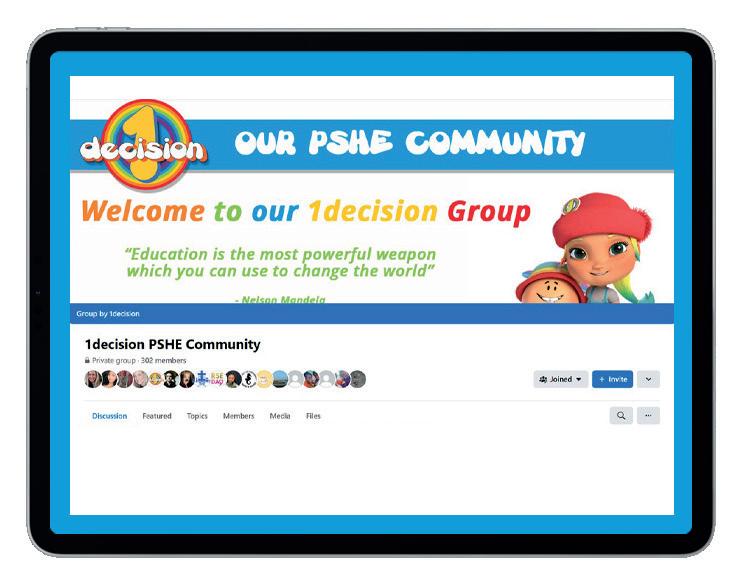
A place for 1decision subscribers and non-subscribers to share ideas, be part of discussions and receive updates. Most importantly, we support you in providing the highest quality lessons across your educational setting.
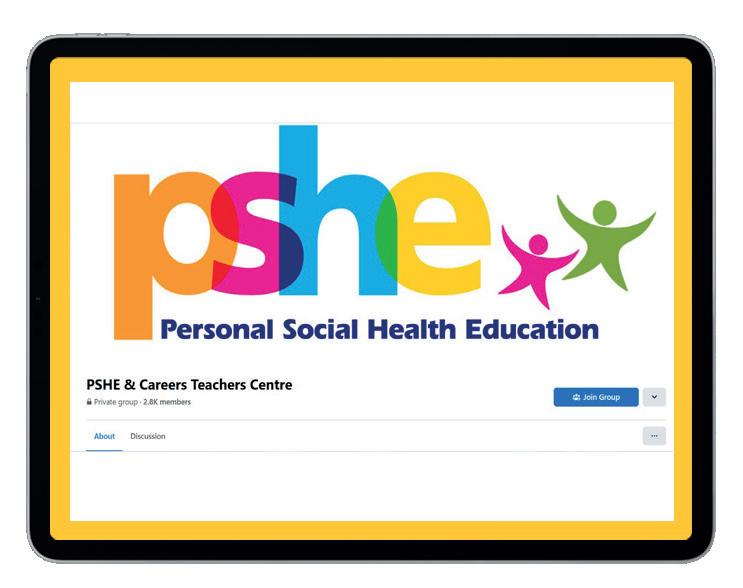
A group for PSHE teachers and providers to share good practice, resources and support. We aim to create a bank of school friendly resources and use the discussion forum to link with other teachers across the UK to share ideas and gain inspiration.
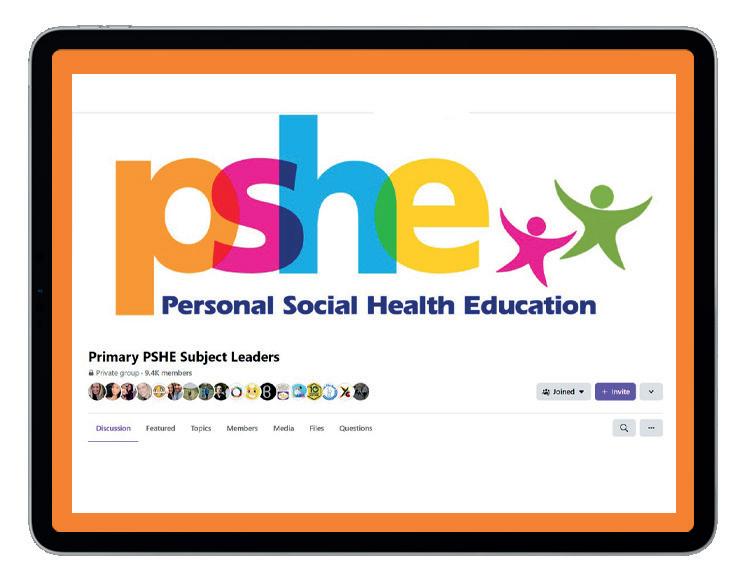
A place for PSHE coordinators within primary schools to share ideas to improve the teaching and learning of PSHE. We also welcome those with a passion for PSHE, or those who have businesses which relate to the teaching of PSHE.
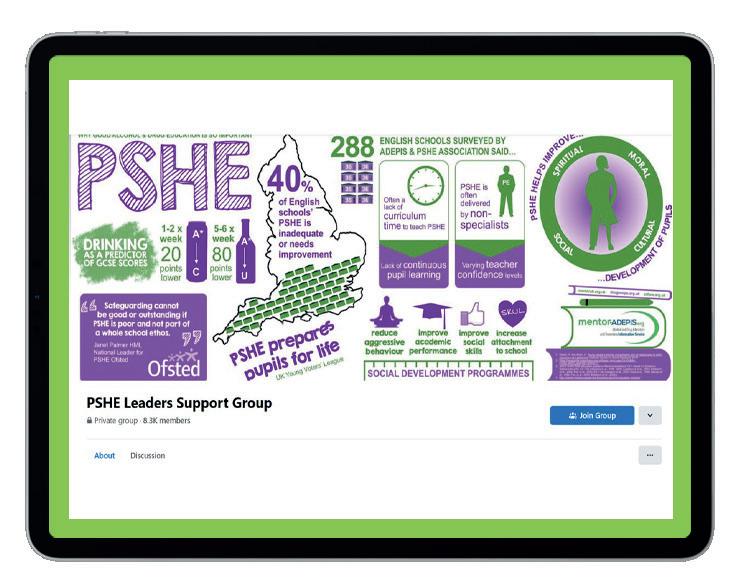
This is a page for PSHE leaders to share good practice and support each other.


